#how marge loves her kids enough that when bart steals
Explore tagged Tumblr posts
Text
you ever watch the simpsons and get hit with the human experience being to love things?
#how lisa loves her cats even after they die#how marge loves her kids enough that when bart steals#he mourns his mothers love more than he feels guilty over stealing#the way maggie manages to covay her love even without words#how homer quit his dream job to make sure that his son had things better than he did#the episode where marge is like ''ill smile for the both of us''#im gonna sob
4 notes
·
View notes
Text
The Simpsons Season 32 Episode 12 Review: Diary Queen
https://ift.tt/3snx5Yt
This The Simpsons review contains spoilers.
The Simpsons Season 32 Episode 12
The Simpsons Season 32, episode 12, “Diary Queen,” may be the sweetest offering of the series. It’s not only sentimental and self-esteem-positive, it’s downright edumacational. At least for Bart, who certainly learns a lesson. Thankfully, as the episode explains by example, he probably won’t retain it.
“What’s the matter, Bart? I figure you’d be used to failing by now,” Edna Krabappel once consoled the spiky haired kid who seemed so determined to get through school without schooling. Marcia Wallace, who played the Springfield Elementary teacher, died unexpectedly in October 2013. Edna’s death was first acknowledged in “Four Regrettings and a Funeral,” from season 25, when Bart wrote “We’ll really miss you Mrs. K” on the chalkboard. He only wrote it once. Her death was punishment enough. Both the character and the voice actor were instrumental in the chemistry of The Simpsons, and chemistry happens to be one of the few things Bart’s ever excelled at in school, even pranking a talent show in the “Haw-Haw Land” episode. But he gets his beakers crossed in the latest installment.
“Diary Queen” opens with an inspired West Side Story song parody, “Too Nice” replacing “Tonight.” It’s time for Ned Flanders’s annual yard sale, and he’s on a holy mission to undersell eBay. Comic Book Guy is looking for a broom to play Quidditch on, Waylen Smithers is going to score some kitsch, and Ned will finally toss those fuzzy dice Maude bought him to the bottom of an impulse item box of jokes he did not get. The Flanders family are parting with their humble possession in a public bid for humility, in case no one notices. Ned gives up Rod’s teeth. Todd consigns his toys to the auction block on the grass. “Playing is a sin that we regret,” one of the Flanders kids explains.
Ned’s bizarre outdoor bazaar is the only segment which has any meanness in it. The Springfieldians want to take advantage of Ned, and openly mock him. Carl and Lenny turn the yard sale into a yarn brawl, and Jimbo’s gang buys commemorative plates just to smash them. It’s enough to send Ned looking for the fans he always carries around in case of stress-induced hot flashes. As Patty and Selma are flicking ashes into Rod and Tod’s baby shoes, it seems Nelson, Bart, and Millhouse are the only ones worthy to buy Ned’s treasured mementos. And, of those, only Nelson’s purchase is authentic. He buys all the bad words, like “adultery” and “fornication,” which Ned cut out of his old religious texts. Nelson has a genuine use for them, you can just tell.
Bart and Millhouse buy the books. Even without the offending admonishments, they swear they’ll still find useful ways to better themselves. Their haul winds up being the fiery centerpiece for a supercool skateboarding feat which no one will ever see. It’s an old joke, but we do get to notice how big Millhouse’s nose looks when he’s picking it. One book, which gives the title to the episode, is spared the conflagration of Bart’s daredevil jump: Edna Krabappel’s diary. Bart recognizes the Ds and Fs, and Millhouse recognizes the smell of Parliament Lights 100s. It’s very telling how these are the most recognizable clues. They are each ready-made character punchlines.
The diary is a font of information. Bart and Millhouse learn all the teachers work night jobs during school hours, and the many lonely secrets of Groundskeeper Willie. But their first use of it is inspired gaggery. Bart learns Superintendent Chalmers keeps his car keys behind the visor. The two kids not only steal the car but take advantage of a free yogurt offer at a car wash. The idea that taking the yogurt and ditching the car is a “perfect crime” is great kids’ logic. It is a little odd, however, that Springfield’s Chief Wiggum sees fourth grade car thieves as inspiration for a little personal time with Officer Lou, but it works within Simpsons logic.
The central point of the episode is Bart’s relationship with his dead teacher, and his relationship with himself. He actually believes someone he thought only saw him as troublesome also considered him “smart as a whip.” It leads him to believe he actually has potential, which he translates to: all the time he was showing his butt he was showing promise. This spurs him into thinking about getting seriously educated. Not only does he try but he succeeds on his first dry run, resisting the urge to draw a skeleton head on a multiple-choice test grid, and getting an A. Not only does he finally understand how his sister Lisa doesn’t suck, but he puts himself on the same level.
Lisa goes through all the stages of jealousy, and even realizes she’s on the verge of obsession when even her imaginary comfort pony begins to look like Bart. This makes it worse, because realizing he is the only thing she can think about only makes her dwell on it. Lisa is usually the family genius, and how she reacts to Bart doing well really depends on the circumstance and need for story conflict. For instance, when Bart had to apply geometry to miniature golf in an early episode, Lisa brought a Zenlike understanding of all things which putt. Lisa does Bart a disservice tonight in the guise of doing the right thing. It’s her MO.
Of course, Marge and Lisa don’t trust Bart’s recent good grades, but while he comes up clean to Marge, Lisa digs up the dirt. Bart correlates “cruel” with “lying” because “they’re both great.” He thinks he’s going to win a Spelling Bee just because he has the potential to do it. Would it have been less cruel for Lisa to let him see how far his belief would get him? She’s set him up for worse humiliations just for an edge at science fairs.
Millhouse gets a few good gags tonight. When Lisa starts developing a rash because of the stress of not crushing her brother’s potential, he pulls cream out of his fanny pack labeled “rash stash.” Groundskeeper Willie is a highlight of the episode. His character has one of the most interesting takes on passive aggressive behavior in comedy. It’s not that he gets it backwards, so much as he pays it forward: Terrorizing Bart with the idea of simmering a new pet into rabbit stew when all he’s thinking of is how much bunnies love stewed carrots.
Read more
TV
The Simpsons Season 32 Episode 11 Review: The Dad Feelings-Limited
By Tony Sokol
TV
The Simpsons Season 32 Episode 10 Review: A Springfield Summer Christmas for Christmas
By Tony Sokol
Subtle social commentary makes its way into the episode. As this is the first episode since the Trump presidency, it opens with a Bald Eagle flying a sign asking “Is it safe yet?” We learn Ned doesn’t find Bill Maher funny. A priest tells Bart and Millhouse reading someone else’s diary in church is not the worst thing you can do within the hallowed walls. Moments later we see the priest handcuffed and escorted past the pews by the police. We can only wonder what offenses are happening at Reverend Lovejoy’s competition.
Fat Tony (Tony Montagna) tells his henchmen his crime family doesn’t kill children, “We wait till they’re 18.” Lisa is kept up at night by the cold dead eyes of Mike Pence. Subtle subversive commentary can be found when Principal Skinner declares the drug-free portion of the school assembly a success because Lisa, the only one in the auditorium, tells him she doesn’t do drugs. But the scene comes shortly after we learn Dr. Hibbert is pushing kiddie-Xanax “sleepies” and “dopies” on her. The best bad side effects are “Portuguese insolence” and the “tendency to see yourself as others see you.”
The episode has quite a few sight gags which work well. The sign outside the Spelling Bee contest reads H-E-A-R, and we see one of the losing contestants ripping up a dictionary on the way to the exit. When Ned starts to preachify in the treehouse, he only stops because Bart is drawing back a trigger finger on his slingshot. Mrs. Krabappel’s beloved cat not only was not harmed during the making of the episode, but was a willing participant, according to the closing disclaimer. One of the stills in the photo montage is of Krabappel watching The Bob Newhart Show, which Marcia Wallace was a regular on.
cnx.cmd.push(function() { cnx({ playerId: "106e33c0-3911-473c-b599-b1426db57530", }).render("0270c398a82f44f49c23c16122516796"); });
For the majority of The Simpsons’ run, Mrs. Krabappel was a sexually independent woman who was often “looking for a substitute to teach me a lesson I sorely need.” She began dating widower Ned in “The Ned-Liest Catch” from season 22. They married in secret and stayed together until her death in “The Man Who Grew Too Much.” The cause of Edna’s death has never been revealed, except in a non-canon, future-set episode. For this installment, Wallace’s two lines are taken from earlier episodes. “Diary Queen” will be her last appearance.
This is a different kind of arc for The Simpsons. “Diary Queen” is on an uplifting trajectory until Lisa knocks it off course, and ends in a sudden life-affirming crash. Bart’s final warning to Marge, “I’ll go over the edge if you try to make me feel better,” is wonderfully skewered, but the final twist is a dose of treacle. The episode was originally slated to premiere on Valentine’s Day, and is a sweet sendoff.
The post The Simpsons Season 32 Episode 12 Review: Diary Queen appeared first on Den of Geek.
from Den of Geek https://ift.tt/2ZFdyq0
2 notes
·
View notes
Text
The Top 50 Simpsons Episodes Ever Ever Of All Time Ever According To Some Guy
No preamble. You know what this is. Let’s go.
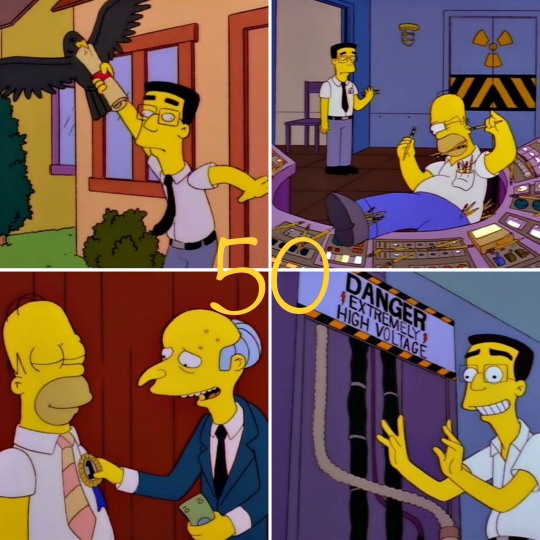
Homer’s Enemy Defining Quote Frank Grimes: I've had to work hard every day of my life and what do I have to show for it? This briefcase and this haircut! And what do you have to show for your lifetime of sloth and ignorance? Everything! Eight seasons in, The Simpsons signed its own death-warrant by introducing Frank Grimes. Grimes is polite, professional and industrious, with a poetically tragic history ranging from parental abandonment to grain silo explosions. He’s the most real character in the show. His torture never ends and his pain is hilarious - “I live in one room above a bowling alley and below another bowling alley”. Eventually, we witness the inevitable result of a reasonable and unlucky man spending time with Homer Simpson: a full-on nervous breakdown. The death of Frank Grimes is the show’s jump-the-shark moment. It might be one of the best episodes, but after showing this level of self-awareness and mean spirit, it was clear that the good times were on their way out. Still, the sight of Bart and Milhouse running rampant around a disused factory sure sugars the pill.
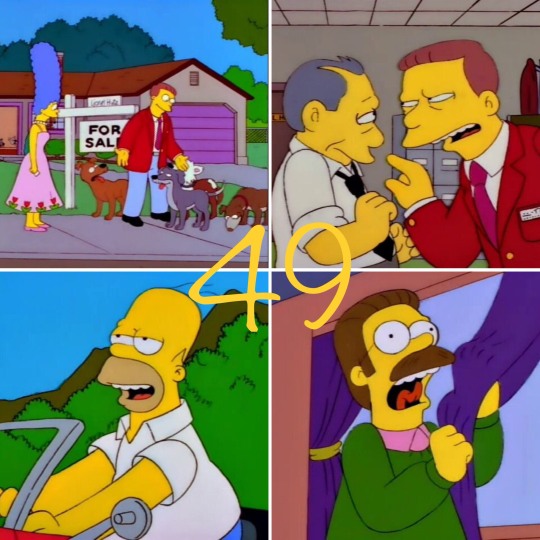
Realty Bites
Defining Quote Lionel Hutz: I’ll let you in on a little secret, Marge. ‘The right house’ is the house that’s for sale. ‘The right person’ is anyone.
Bending the truth is increasingly becoming an inseparable component of people’s livelihoods. As a result, this episode has aged very well indeed. Marge becomes an estate agent, only to find that she must resort to dishonesty in order to make a sale. It’s a smart little gem that skewers certain businesses’ perfectly legal day-to-day trickery. Largely though, this is on the list because it’s really funny. Aside from the ruthless and cheery Lionel Hutz making his final appearance, we get Snake trying to steal back his car “Lil Bandit” from Homer (“She needs premium, dude! Premium!”), the debut of endearingly pathetic salesman Gil Gunderson, and of course Kirk VanHouten appearing just long enough to get his arm sliced off with razor-wire.
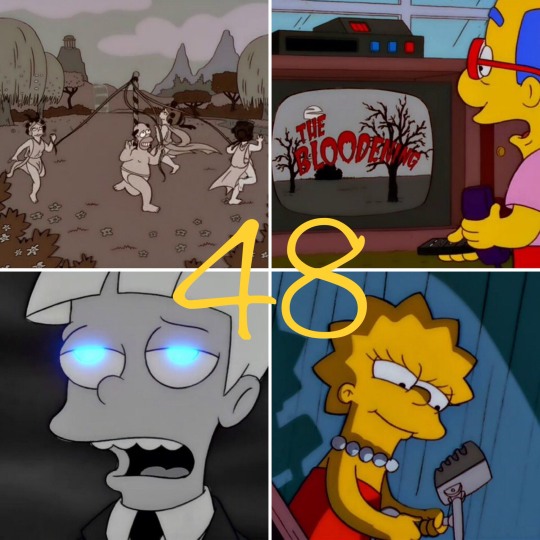
Wild Barts Can’t Be Broken
Defining Quote Demon child: We know all your secrets.
Hey, look everyone! It's an episode from Season 10! That’s right, the most recent entry on the list and it came out two entire decades ago. Nonetheless, this one’s an underrated and quotable treat. After Homer and his friends get drunk and trash the elementary school, the local kids get the blame and a curfew is enforced by the adults. This is the kind of episode that captures some of the best parts of being a child: conspiring against grown-ups, secret societies, and discovering movies you’re definitely too young to watch. In this case, the kids collectively break curfew to watch ‘The Bloodening’ at the local drive-in, and are inspired to broadcast their parents’ embarrassing truths via radio until the curfew is lifted. It also pokes much-needed fun at the baggage that parents pass onto their offspring: “I had to talk to my mom all night. She’s got problems. Scary problems.” It’s consistently fun and funny, but its best moments revolve around ‘The Bloodening’. The film itself (a fond pastiche of The Village of the Damned), and Bart and Lisa imitating the demon children’s British accents are flat-out hilarious and make this episode (arguably) the show’s last true classic.
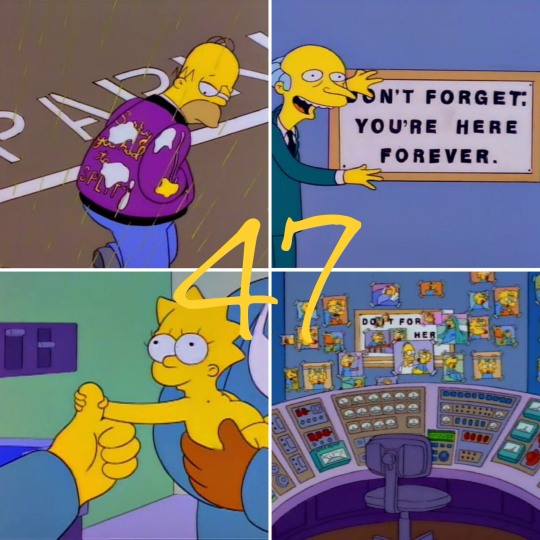
And Maggie Makes Three
Defining Quote Homer: Everything in our lives is finally perfectly balanced. I hope things stay like this forever.
Rarely does TV walk the line between bleak and uplifting with such acrobatic skill. When looking through photo albums, Bart and Lisa wonder why there are no pictures of Maggie. This prompts Homer to recount her origin story, complete with a dramatic sperm impersonation. That being said, this isn’t really about Maggie at all. It’s about the happiness that Homer had to give up for her. Due to lack of funds, he leaves his dream job at the bowling alley to re-apply at the power plant, and in a moment of pure sadism, Mr Burns hangs a plaque in Homer’s workstation displaying the five most demotivating words in history: “Don’t Forget, You’re Here Forever”. However, as is so often the case in TV and in life, love is the answer. On meeting Maggie for the first time, his perspective changes, and reveals to the kids where all the photos are: “I keep them where I need the most cheering up.” It’s a beautiful glance at the lives that parents abandon for the sake of parenthood, and it’s fully-loaded with great jokes as always. There’s Nightboat (“Ugh, every week there’s a canal!”), Homer polishing his head in the Shine-O-Ball-O, and Bart’s uncharacteristic fury at the lack of quality toilet paper.
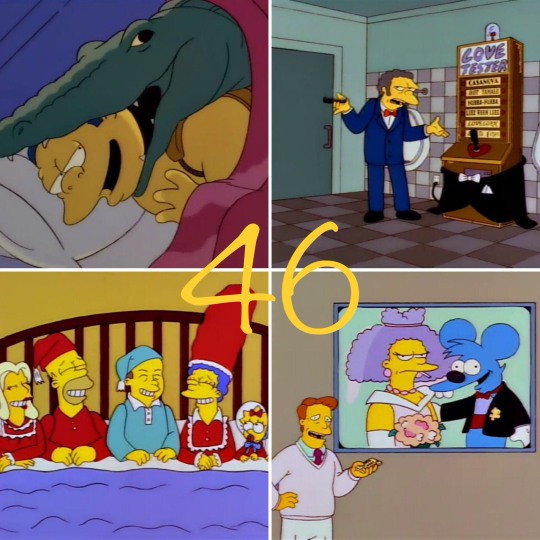
The Simpsons’ Spin-off Showcase
Defining Quote Lisa: Chief Wiggum, I can't wait to hear about all the exciting, sexy adventures you're sure to have against this colorful backdrop!
With 30 seasons and about 13 watchable ones, The Simpsons is now more bad than good. Its refusal to die a graceful death is an ironic tragedy, since they used to be so good at poking fun at desperate TV shows and networks that had run out of ideas. Speaking of which, to quote Troy McClure, “Spin-off! Is there any word more thrilling to the human soul?” Leave your feelings at home - this one is pure relentless comedy. Chief Wiggum gets his own New Orleans detective show with Seymour “Skinny Boy” Skinner as his leg-man. Later on, the ghost of Grandpa Simpson teams up with Moe the Bartender to find love in a canned-laughter sitcom. Even when ‘The Love-Matic Grandpa’ sneaks in some very dark jokes (“I’ve suffered so long. Why can’t I die?”) it’s a gleeful and creative silliness that they never quite captured again. The final segment is a cynical lampoon on a very cynical format - squeaky clean everything’s-ok variety shows like Sonny & Cher and Laugh-In. ‘The Simpson Family Smile-Time Variety Hour’ replaces the bookish principled Lisa with a tall blonde cheerleader, and the gang work their way through dreadful sketches and songs about beavers and candy. The worse these segments get, the funnier they are. You can even see the show’s “Special Guest” Tim Conway fleeing the stage at the first opportunity. It’s a superb skewering of bad TV by a show that hasn’t been good for a very long time. “How do you keep The Simpsons fresh and funny after eight long years? Magic powers, wedding after wedding after wedding, and did somebody say “long lost triplets”?” They weren’t far off.
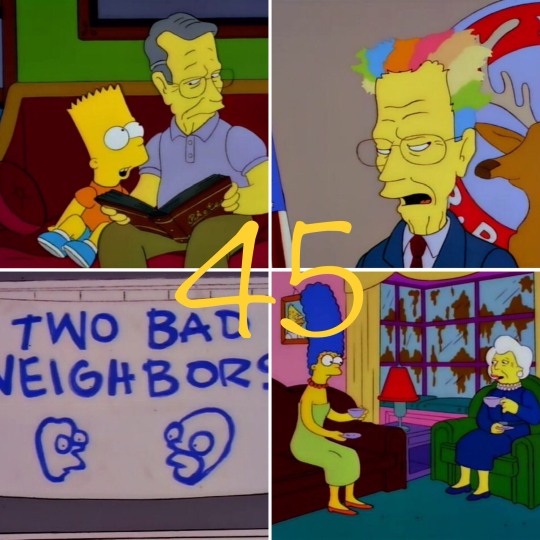
Two Bad Neighbors
Defining Quote George Bush [typing]: And since I'd achieved all my goals as President in one term, there was no need for a second. The end.
Never anger a writer with a public platform. On January 22nd 1992, President George Bush Sr. made a speech declaring his intentions to strengthen the American family - to make them “more like the Waltons and less like The Simpsons”. In response, the show released a promo clip of the family watching the speech, with Bart chipping in “Hey, we're just like the Waltons. We're praying for an end to the Depression too." That was a short-term response. A more lasting retaliation came sometime later in the form of this diamond of an episode - arguably the dominant image of George Bush Sr to an entire generation. Bush had been out of the White House for three years at this point, so there wasn’t much point in making him the subject of political satire. Instead, they sunk their efforts into a more worthy pursuit: being annoying. The writers cast him as the fusty Mr Wilson to Bart’s Dennis The Menace - a prim, proper and petty old fart whose suffering you can’t help but enjoy. Meanwhile, his wife Barbara is portrayed as a kindly and diplomatic grandmother figure who gels well with Marge. This, strangely enough, was also informed by real-life events. Barbara Bush said publicly that she thought that The Simpsons was “the dumbest thing [she] had ever seen”. However, the writers wrote her a letter posing as Marge, which moved Bush so much that she replied with an apology. So, to reiterate the moral of the story, be nice to comedy writers - they can make you a figure of fun for decades. And what fun this is.
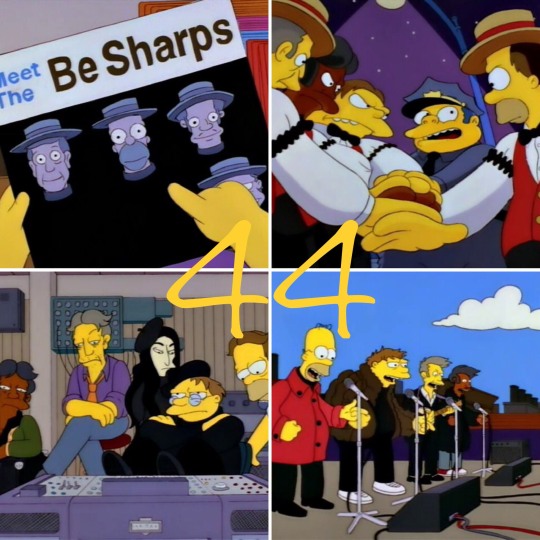
Homer’s Barbershop Quartet
Defining Quote Principal Skinner: We need a name that’s witty at first, but gets less funny each time you hear it.
Matt Groening once curated the All Tomorrow’s Parties festival, arranging a line-up so shockingly good that they should have just given him majority control of the company. Either way, the bottom line is that he has a lot of time for music and so does the show. This episode is a muso’s dream, with Beatles references bouncing left right and centre, well-aimed snubs at the Grammy awards (“Hey! Don’t throw your garbage down here!”) and a final hurrah to the untainted joy of playing together. Homer forms a barbershop quartet called The Be Sharps with Principal Skinner, Apu and Chief Wiggum, who is soon replaced by Barney a la Pete Best and Ringo. Wiggum is one of the stars of the show here, and his dejection at being cast out is as endearing as his puppy-ish persona. Plus, we get our first glimpse at the beautiful soul hiding behind Barney’s tragic alcoholism. Nonetheless, we’re skating around the main attraction - a song written by Homer called ‘Baby On Board’ which makes The Be Sharps international stars and gives this episode its own irresistible theme tune. Oh, and George Harrison’s in it! What a nice fella.
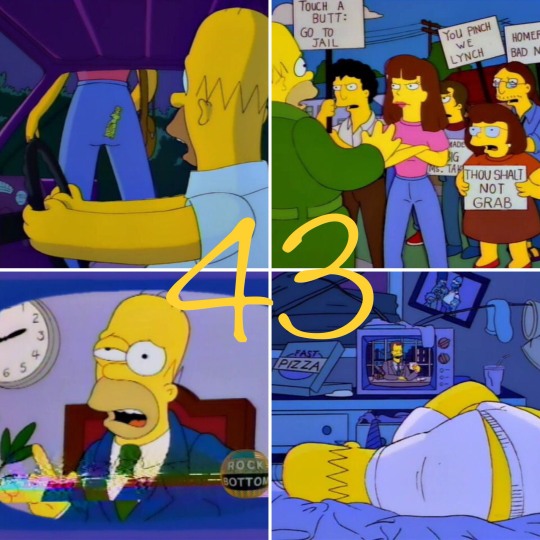
Homer Badman
Defining Quote Kent Brockman: Now, here are some results from our phone-in poll: 95% of the people believe Homer Simpson is guilty. Of course, this is just a television poll which is not legally binding, unless Proposition 304 passes; and we all pray it will.
Boy oh boy has this one only gotten more relevant. Homer and Marge go to the Candy Industry Trade Show, during which he steals the highly valuable and delicious Gummy Venus de Milo. After driving the babysitter home, he notices said priceless work of confectionary stuck to her jeans as she exits the car. He peels it off and she mistakes his actions for sexual harassment. What follows is a funny, sharp and surprisingly even-handed dissection of trial-by-media, in which everything Homer does - from slipping over in the shower to looking for his keys - is further evidence of him being a dangerous pervert. It’s nice to have this episode in existence because this kind of subject (especially these days) is absolutely no fun to talk about. No one wants to be seen defending someone who might be a sexual predator, yet if you go too far the other way, you may be vilifying someone who’s done nothing wrong. It’s a thorny issue and this episode handles it very well indeed. The accusing babysitter isn’t the antagonist of the episode - after pointing the finger, she barely appears again. It’s the ensuing whirlwind of scandal propagated by the media for entertainment which is the actual monster. You really see Homer’s pain too - the shot of him watching TV in a reverie of depression is one of the show’s most resonant images. Nonetheless, laughs come thick and fast. Lest we forget, this is the episode that gave us the super-sour candy ball, Gentle Ben and ‘Under The Sea’.
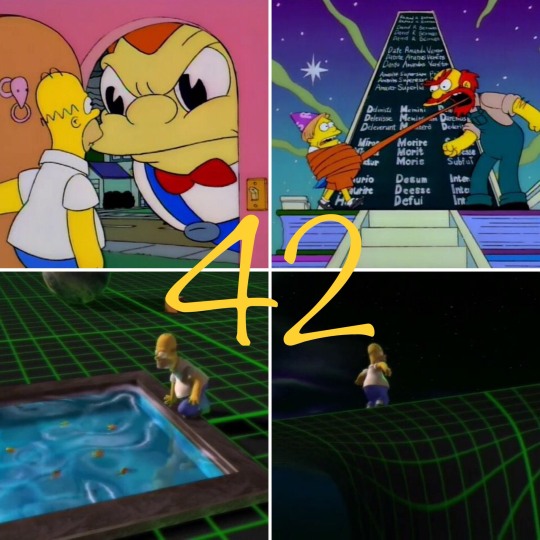
Treehouse of Horror VI
Defining Quote Homer: Did anybody see the movie ‘Tron’?
There are now twenty-nine editions of The Simpsons’ Treehouse Of Horror. A non-canon cartoon horror-comedy showcase spoofing everything from Dracula to Harry Potter to The Omega Man, as well as dreaming up a few oddball ideas of its own - it’s an institution within an institution. So why is there only one of them on this list? Well, for a start, it’s a lot harder to make an impression or maintain consistent quality with three short stories rather than one 20-minute one. Segments are easier to remember than actual episodes. Treehouse of Horror VI is, however, a true standout. It starts out fun and silly, then gradually descends into something deeper, stranger and sadder. ‘Attack of the 50ft Eyesores’ is a nifty schlocky satire on advertising. ‘Nightmare On Evergreen Terrace’ recasts Groundskeeper Willy as Freddy Krueger with hilarious and surreal results. Dream sequences have always been one of the show’s many secret weapons, so to dedicate an entire Treehouse of Horror segment to them is very welcome - especially with Martin Prince as The Wizard of Latin, and Willy’s genuinely stomach-churning final incarnation as a giant bagpipe spider. These are both great shorts. That being said, nothing - not in this Halloween episode, nor in any other - compares to its finale: Homer3. Here, Homer finds a portal behind a bookcase and becomes trapped in a computerised vaporwave-esque 3D world full of grids, equations and geometric shapes. Speaking personally for a moment, this experimental, frightening and beautiful short changed my life. It’s definitely funny (I’m still waiting for the official classification of a Frinkahedron), but there’s a mystery and a loneliness to the world he finds. It was an entirely new feeling for me, a new concept, a new atmosphere, a new kind of fear - of falling into hopeless unintelligible non-existence. It feels strange to say this about something as frivolous as Treehouse of Horror, especially when said segment ends with the line “Ooh! Erotic cakes!”. Nonetheless, Homer3 opened doors in my heart and mind that have never closed since.
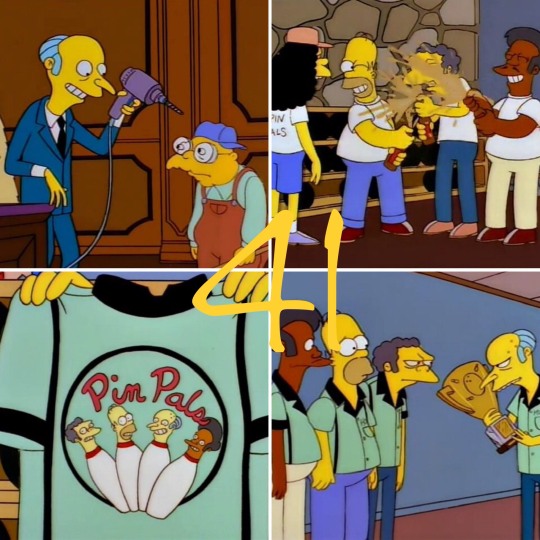
Team Homer
Defining Quote Mr Burns: Look at that! All the way to the end with only one push!
You ever seen The Boat That Rocked? Is it good? I’ve seen it 6 or 7 times but I’m still not sure. On the one hand, it’s a dumb movie about a load of mates on a boat talking about how great music is while trying to stop “the man” from harshing their mellow. On the other hand, it’s a dumb movie about a load of mates on a boat talking about how great music is while trying to stop “the man” from harshing their mellow. That not-very-good film is surprisingly easy to love because it’s about a bunch of likeable schlubs being friends. It’s the same reason why ‘Team Homer’ is a great, rather than a “good” episode. (That and the jokes, obviously.) Homer, Apu, Moe and Otto form a bowling team called the Pin Pals, with Homer coercing the $500 start-up fee from Mr Burns during one of the latter’s ether trips. The team end up mopping the floor with the competition thanks to their camaraderie and it’s a real treat. Conflict has to come from somewhere though, and it does so in the form of a now-sober Burns who finds the cheque he wrote for “Bowling” (not to be confused with “Bowelling”) and insists on joining the team. The B-plot is well worth a mention too. After Bart’s Mad Magazine T-shirt causes a riot, Principal Skinner enforces school uniforms (“Alright, pick your size, extra small or extra large - we’ve got both! No pushing now, I… what? Oh, I’ve just been informed we’ve run out of extra large”). It doesn’t tackle any big concepts or break new ground. Nonetheless, Team Homer is a thoroughly sweet and memorable episode stuffed with great jokes and endearing character detail.
5 Brief Honourable Mentions
- A Milhouse Divided
Pour one out for Kirk VanHouten, one of TV’s great deadbeat dads. Rarely does a minor character’s ego get such a thorough kicking as his. He gets divorced, gets fired, watches his wife run off with a gladiator, buys a bed designed for a manchild and cuts a demo tape called ‘Can I Borrow a Feeling’. Tough break.
- Brush With Greatness
Homer finds Marge’s portraits of Ringo Starr in the attic, prompting her to rediscover her yen for painting. It’s always nice when we glimpse what talents and pursuits Marge gave up to be a mother - yours and my parents probably did something similar. Plus, y’know, Ringo Starr - “I hung it on me wall!”
- Kamp Krusty Bart and Lisa get sent to Krusty The Clown’s summer camp, only to discover it’s basically a gulag in the woods. A gulag with sweet, nourishing gruel.
- Grade School Confidential Principal Skinner and Mrs Krabappel kindle a secret romance, using a disgruntled Bart as a messenger and confidante. We almost never get to see such miserable characters being so radiantly happy.
- I Love Lisa Gross, gormless and good-natured Ralph Wiggum experiences his first unrequited crush. You can indeed pinpoint the second that his heart rips in half. Fun Fact: this was based on the experiences of showrunner Al Jean, who actually did receive a Valentine's card at school reading “I Choo-Choo-Choose You”.
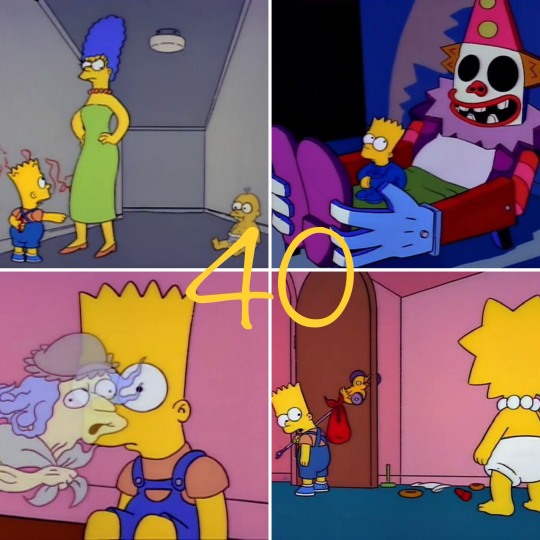
Lisa’s First Word
Defining Quote Bart: I liked it when it was just me, Mom and Homer. You wrecked everything.
As with the last flashback episode seen here, this isn’t really about the person in the title. First and foremost, this is Bart’s story, specifically his transition from “only child” to “older brother” and hating every minute of it. You know the story - the family find out they’re expecting, they move to a bigger house, and Bart tries to get rid of Lisa until she says her first word “Bart”, thus proving that she’s loved him the entire time. Nonetheless, it’s not the plot that makes this episode brilliant so much as its sense of perspective. ‘Lisa’s First Word’ is one of TV and film’s very best attempts at capturing the mindset of a child. A great example of this is when Bart finds out he’s soon going to have a new brother and sister, and he fantasises about the benefits of having a baby around - having someone to blame for drawing on the wall, using them to prop up a ramp for his tricycle etc. I’d really recommend watching this scene again. Notice how bare the rooms are, that there are no buildings on the road he rides his trike on, and that the baby itself (who he refers to as “baby”) is a near-expressionless human lump. This is how kids dream. At that age, our imaginations are less developed and the imagery they project is very basic. Childhood memories are also portrayed perfectly, with the drifting montage of “From now on the baby sleeps in the crib… Iron helps us play!... Ahoohohooohoohohooohohooo!!!... Hello Joe!!” circling around his head. Everyone has childhood memories which are scary or unpleasant for reasons they can’t explain. Even “Hello Joe!” - one of the most quoted lines in the show (certainly when I’m in the room) - is said by a woman with dementia who never appears again, ever. Haunting indeed. Nonetheless, all’s well that ends well. Bart and Lisa have their ups and downs but this shows their first spark of sibling affection. What’s more, it ends with Maggie’s first word spoken by (I’m absolutely 100% serious) Elizabeth Taylor. In many ways, the story that happens in ‘Lisa’s First Word’ is pretty unremarkable, but when you’re a young child, every life-change feels earth-shaking. It’s really quite miraculous how well that feeling is bottled here. Also, there’s that bit where the Korean gymnast breaks his leg. Good times.
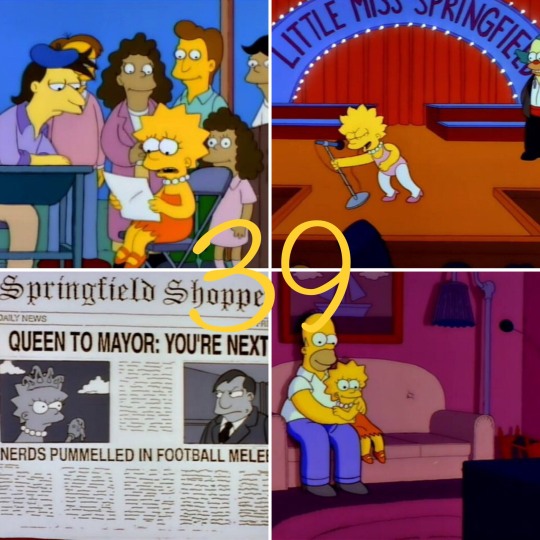
Lisa The Beauty Queen
Defining Quote Lisa: Dad, do you remember why you entered me in that pageant? Homer: I dunno. Was I drunk? Lisa: Possibly. But the point is, you wanted me to feel better about myself. And I do.
After a caricaturist draws a picture of Lisa chasing boys, she develops a complex about her appearance. In response, Homer sells his ride on the famous Duff blimp to enter her into the Little Miss Springfield beauty pageant. After some initial protests, Lisa agrees and throws herself into the role, eventually being awarded the title after the original winner gets struck by lightning. Pageant-material beauty isn’t something we associate with Lisa, but she uses her charm to rise to a position of power and influence, refusing to stick to the script provided by her sponsors, Laramie Cigarettes. Her independence proves irksome to her employers, who strip her of her title on a technicality. Not an awful lot to annotate about this episode but the rewards come from Lisa finding her voice. In more recent seasons (aka “the bad seasons”), she’s a preachy condescending bore, but here she’s full of righteous rage, gladly biting the hand that feeds her and risking her position for the sake of her moral compass. It brings out the best in her and her family. Lisa-centric episodes in the classic seasons are always reliable stand-outs, and this is so boringly great there’s really not much else to say. She’s as vital a role model now as she ever was, for children and adults. Standout jokes include Skinner going all green-beret on Disney’s lawyers, Amber Dempsey winning Pork Princess and Little Miss Kosher, and the absolute worst show-tune in history (“L the losers in her wake, I the income she will make, T is for her tooth-filled mouth, T is for her tooth-filled mouth”).
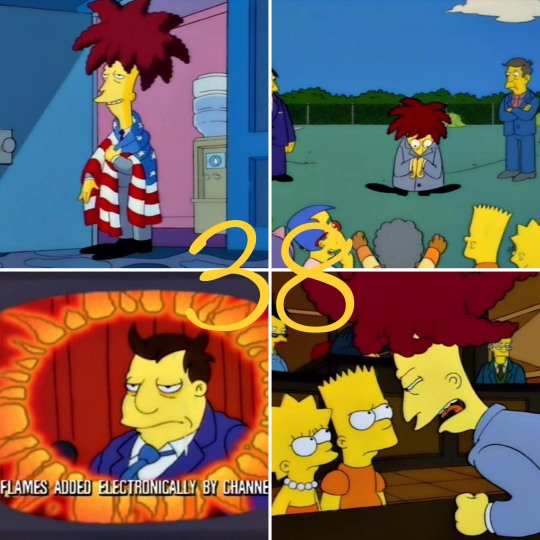
Sideshow Bob Roberts
Defining Quote Sideshow Bob: Because you need me, Springfield. Your guilty conscience may force you to vote Democratic, but deep down inside, you secretly long for a cold-hearted Republican to lower taxes, brutalise criminals and rule you like a king.
Oh boy… well, looks like The Simpsons accidentally satirised the future again, and it’s more uncomfortable than ever. Dangerous right-wing views? Check. Narcissistic crowd-pandering candidate? Check. Substantial accusations of electoral fraud? Check. Sure, these things were around long before Donald J Trump combined all-this-and-more into an all-powerful omnishambling fuckstorm. Nonetheless it’s still frightening and brilliant how right this episode had it, two decades before its peak relevance. Sideshow Bob, a man who had already framed one person for armed robbery and tried to kill two others, is released from jail with the help of a conservative talk-show host Birch Barlow (a deliberate dead-ringer for Rush Limbaugh). He then becomes the Republican candidate for Springfield mayor and soars in the polls thanks to his charisma, his skill as an entertainer and media smear campaigns… oh god… Well, it sure is great in all the ways satire should be. It’s a scary time in the Western world right now thanks to the same political corruption and voter complacency that this episode nails to the wall. Its subjects are just too exhausting to talk about right now, so frankly it’s a goddamn miracle that this episode is still so much fun to watch.
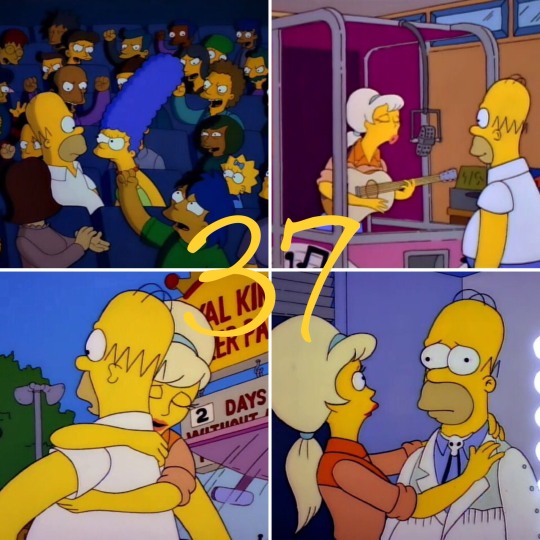
Colonel Homer
Defining Quote Lurleen: Oh, Homer, no man has ever been this nice to me without, you know, wanting something in return.
Since creating the show, Matt Groening hasn’t actually had an awful lot to do with the creative direction of The Simpsons. In fact, how many episodes did he write on his own? Just this one, but that gives him one hell of a scoring average. After an argument with Marge, Homer drives a long way from home and, after winding up at a redneck bar, he’s captured by music of a singing waitress called Lurleen Lumpkin (based on country legend Loretta Lynn). He convinces her to record her songs and she becomes an overnight sensation. Lurleen falls head-over-heels in love with Homer and a gigantic emotional mess ensues. The Simpsons would try and re-run this plot-line in the future, each with another temptress trying to steal Homer away (see: ‘The Last Temptation of Homer’) but none of these come close to the heart and resonance of Colonel Homer. It boils down to this: everyone in this love triangle is vulnerable, none more so than Lurleen. She’s had a hard life, and when a man arrives who treats her with kindness and respect, she can’t bear the thought of losing him - a far more realistic and poignant dilemma than most. A huge amount of credit belongs to her voice actor Beverly D’Angelo - far more credit than most guest stars have earned, in fact. For a start, Lurleen sings four great songs throughout the episode, and not only does D’Angelo sing beautifully, but she also wrote them. Quite the feat considering I’ve never forgotten them. As well as being a sensitive and funny look at the temptation of extramarital attraction, it’s the episode’s portrayal of music that makes it soar. It brings people together, it comforts, it seduces, it apologises and it heals. There is so much affection in this episode - for music, and the people who are overpowered by it.
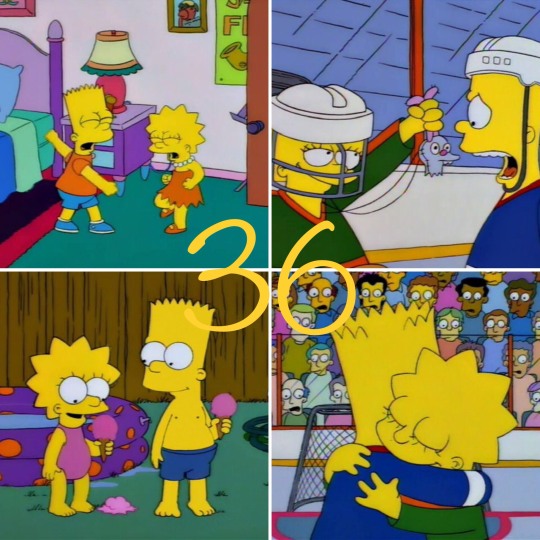
Lisa On Ice
Defining Quote Homer: Oh my God, Marge. A penalty shot with only four seconds left. It's your child versus mine! The winner will be showered with praise; the loser will be taunted and booed until my throat is sore!
Sibling rivalry, am I right? After Lisa is told she’s failing gym class (something that Homer seems to value a great deal because “Sports sports sports sports sports!”) she is coerced into joining a pee-wee hockey team. She suddenly finds out she has a God-given talent as a goalie and becomes a foul-mouthed net-guarding wunderkind. Unfortunately, hers and Bart’s hockey teams are soon due to play against each other, which makes reconciliation impossible - right up until the last moment. The ending single-handedly makes ‘Lisa On Ice’ one of the sweetest episodes, but it’s also one of the funniest. We’re treated to Homer being superbly unhelpful by encouraging the competition, Marge stealing Milhouse’s teeth to make a point, Bart’s remorse over the death of Mr HoneyBunny and of course the forever-quoted “Don’t make me run, I’m full of chocolate”. It’s just as much of a war between the parents as well as the kids. Nonetheless, Marge’s compassionate influence wins, resulting in a final scene that’ll make you want to call a family member and tell them you love them.
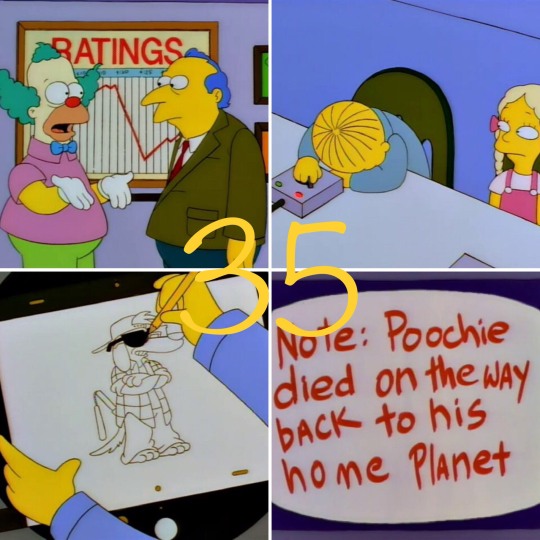
The Itchy and Scratchy and Poochie Show
Defining Quote Lindsey Nagle: We at the network want a dog with attitude. He's edgy, he's "in your face." You've heard the expression "let's get busy"? Well, this is a dog who gets "biz-zay!" Consistently and thoroughly.
Maybe The Simpsons can last forever, but that sure as hell doesn’t mean that it should. Twenty years after its last good season, the show is still going. Still going and utterly utterly wretched. If you want to know how the writers feel about this, watch ‘The Itchy and Scratchy and Poochie Show”. The beloved ultraviolent cat-and-mouse cartoon show Itchy and Scratchy is losing viewers, and in an act of desperation, the network decides to add a new character: Poochie The Dog. I once went to a talk by the memoirist David Sedaris, during which he said “You should choose only one thing to be offended by, and I choose cartoon animals in sunglasses. If Paddington 2 was made in America, he’d ride a skateboard and say “Awesome”.” That’s Poochie in a nutshell - a misguided, focus-grouped and joyless disaster. What’s more, Homer is roped into playing the doomed new character, so we get a front-row seat in watching his dreams get crushed. This is a real rarity in TV - a sharp and self-aware meta-commentary that never stops being funny. It’s an episode about the show itself, and the writers even take a few pot-shots at their fans. Otto: Woah, a talking dog! What were you guys smokin’ when you came up with that? Writer: We were eating rotisserie chicken. In a perfect world, this would have been the last episode of the show. Maybe two more seasons and then have this as the finale? Either way, it’s a sensitive and diplomatic demonstration about why good things must come to an end, or else they’re just not good any more. Ahem.

Marge vs The Monorail
Defining Quote Lyle Lanley: So then - “mono” means “one”, and “rail” means “rail”. And that concludes our intensive three-week course.
It’s hard to think of an episode that’s such a universal crowd-pleaser as this one. When Mr Burns is fined $3M for dumping toxic waste, a town meeting is called to decide what to do with the money. After numerous sensible suggestions, Lyle Lanley - a flashy salesman played by the irreplaceable Phil Hartman - appears from nowhere and whips the crowd into a frenzy over his pitch for the Springfield Monorail. Lanley proves to be a total crook and after Marge discovers his notebook featuring nothing but diagrams of him running away with suckers’ money, it’s up to her to prevent total disaster. This one was written by the most famous alumni of The Simpsons’ writers’ room - Conan O’Brien. It figures - this episode is enough of a CV to get you whatever job you want. It really feels like every line is somehow memorable and quotable, even… huffffffff - ok. Ok, there’s one thing I hate, HATE about this episode. For some reason they bring Lurleen Lumpkin back, just to show her in and out of rehab with a voice like a brillo-pad, and having spent the previous night in a ditch. Thanks to Kent Brockman’s reaction (“How about that, folks!”) it’s still funny, but goddamn is it mean-spirited. And thank goodness I got that out of the way, because every single other part of this episode is great. Everyone knows it, everyone loves it, no one needs to explain it. Anyway, I’m just gonna reel off some quotes because there’s nothing else to say. “The ring came off my pudding can!”; “I call the big one bitey”; “And two comely lasses of virtue true”; “I shouldn’t have stopped for that haircut. Sorry”; “All those bald children are arousing suspicion”; “I like the way Snrub thinks!”; “A solar eclipse - the cosmic ballet goes on”; “Mono- d’oh!”. Etc. Done.
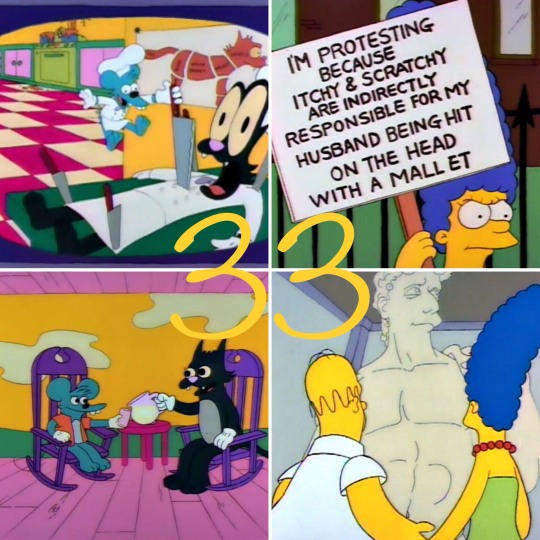
Itchy & Scratchy & Marge
Defining Quote Marge: I guess one person can make a difference, but most of the time, they probably shouldn’t.
This, right here, is where The Simpsons totally mastered the art of neutral satire. ‘Itchy & Scratchy & Marge’ puts censorship, media influence on children and puritanical pressure groups under even-handed scrutiny. After Maggie attacks Homer with a mallet, Marge levels the blame at the cartoon violence of Itchy and Scratchy - not without reason. To the annoyance of Bart, Lisa and a host of other fans of the show, she starts a protest movement, which catches fire quickly. The frequent hypocrisy of these “moral” crusaders also gets thoroughly lampooned when Itchy & Scratchy creator Roger Meyers reads his hate mail: “I will never watch your show, buy any of your products... or brake if I see you crossing the street? Wow, that’s cold.” For better or worse, the movement achieves everything Marge wanted, but despite “conveying a very nice message about sharing”, the “new and improved” Itchy and Scratchy is unwatchable and the children turn off the TV. The utterly beautiful Beethoven-soundtracked sequence showing all the kids playing outside on a sunny day has a sad ironic tinge to it. The prettier it gets, the less realistic it feels. It’s only when Michelangelo’s David comes to an exhibition in Springfield that Marge’s worldview is challenged. She thinks it’s a work of art and everyone should see it, but then her own pressure group wants it banned. “It's filth! It graphically portrays parts of the human body which, practical though they may be, are evil.” In the end there are no winners or losers, but it illustrates a multi-faceted and ever-relevant conversation in rich detail. This is one of the most flat-out clever episodes from start to finish. Wisdom embraces doubt, and there’s doubt from every angle here, not to mention jokes for days. “Wasn’t that funny, boys and girls? Well?? Wasn’t it!?”
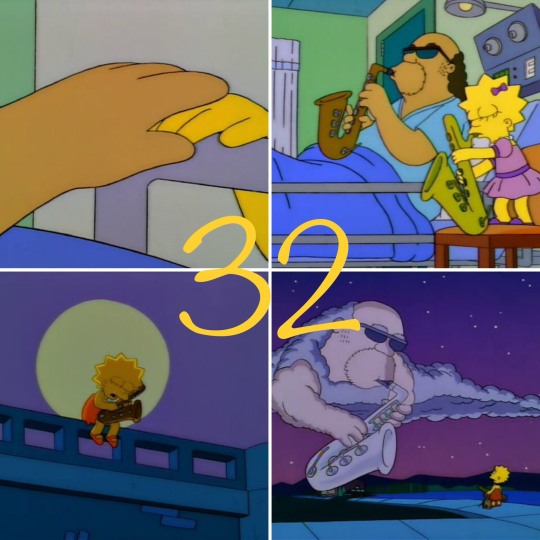
‘Round Springfield
Defining Quote Lisa: How come it won’t stop hurting?
Lisa’s hero, the local unlucky jazz musician Bleeding Gums Murphy, only appears as a speaking part in two episodes. This is the second, and most definitely the last. Look out, boys and girls - we’ve got a gut-wrenching story about grief on our hands. When Bart is hospitalised with an appendicitis, Lisa runs into her idol in the adjacent room and they have a spirited chat and jam. She continues to visit him, and he even gives her his sax. Overwhelmed with passion and gratitude, she brings the house down at her school band recital, but upon returning to tell him the good news, a nurse informs her that Bleeding Gums has passed away. What we’re left with is one of the most consistently heartbreaking and stirring episodes within the classic seasons. We witness Lisa trying to handle the demise of her hero, attending his otherwise deserted funeral, and realising how she may have been the only person whose life he truly touched. We should give extra credit to Yeardley Smith, the voice of Lisa, who gives one of her most moving performances ever. Even the score - which adds saxophone fills to its usual strings and woodwinds - adds to her haunted state of mind. Nonetheless, there are some flat-out hilarious set-pieces, such as Homer trying to improvise a jazz melody, and Bart imagining his reincarnation as a butterfly. Bart is a particular treat in this episode, coming through for his sister by spending a whopping $500 on Bleeding Gums’ album so Lisa can honour his memory. On a curiously positive note, it ends with a magical-realist jam session with a cloud-dwelling ghost (yep) and the knowledge that those who inspire and move us are never truly gone. ‘Round Springfield is a gigantic and worthy salute to the artists who make us feel less alone in the world.
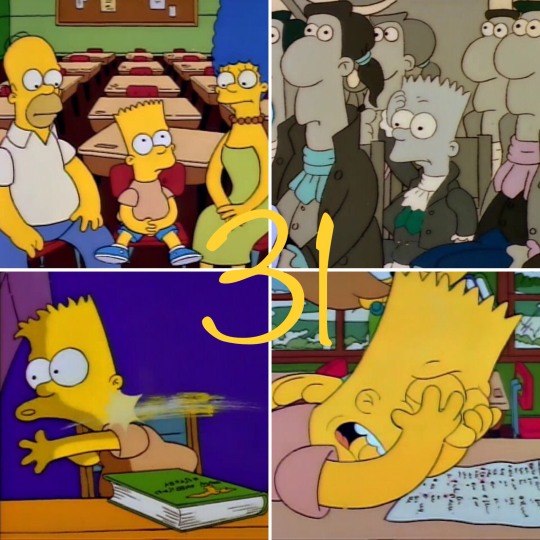
Bart Gets an F
Defining Quote Bart: No, you don't understand! I tried this time, I really tried! This is as good as I can do, and I still failed!
Bart isn’t always an easy character to like. The “bad boy” rarely is, but the times in which he earns your love are worth treasuring. He’s Homer’s son through and through - not too bright, often short-sighted when it comes to emotional consequences, and a surprisingly big heart. The Simpsons’ second season brought a new polished look, sharper writing and slicker voice acting, and it kicked off with a glorious showcase for Bart’s vulnerability. He doesn’t enjoy failure, even though he courts that image as a defensive strategy. Academia, however basic, isn’t his strong suit, and he struggles to concentrate and apply himself. However, when he’s threatened with the possibility of having to repeat the fourth grade, he does his absolute best. He asks for help from Martin, the school brainiac, and works the whole way through a (gorgeously animated) snow day in order to pass a history test. His frustration is palpable - endearing as it is concerning. When he asks Mrs Krabappel to grade his paper there-and-then, he still gets an F, and bursts into hysterical tears in one of the most devastating moments in the entire show. How anyone can watch this episode and not immediately warm to Marge’s special little guy is a mystery. This also might be Nancy Cartwright’s finest example as a voice actor. Nonetheless, after demonstrating applied knowledge at the last minute, Bart is given a D-minus and passes by a hair’s breadth, so he can finally… stay in the fourth grade for the rest of his cartoon shelf-life. Okie dokie then!
5 More Honourable Mentions
-
Marge Gets a Job
After some “creative” CV editing by Lisa, Marge lands a job at the power plant to pay for the house foundation repair. The biggest laughs come from when Mr Burns falls in love with her - “Why, Marge! Look at all those flies buzzing around your head. You’re a mess, woman!”
- Bart Gets Famous After a fateful accident as an extra on the Krusty the Clown Show, Bart becomes a media sensation with a silly catchphrase and discovers that fame is indeed a fickle bitch-goddess.
- Homer’s Phobia No it’s not in the countdown. Shock of shocks, gay jokes from the 90s haven’t aged all that well. That being said, not only are a decent chunk of them still very funny here, but it’s about as optimistic a portrayal as you could have hoped for at the time. Plus, he may be an “issue of the week” character but John fucking Waters is in it!! Zzzzzapp!!
- Bart’s Dog Gets an F Santa’s Little Helper is the star of the show for the first time since the pilot. He and Bart bond over their shared incompetence while desperately trying to get him a passing grade in obedience school. Bless.
- Marge on the Lam
Marge and her new neighbour take a road-trip in a stolen vehicle while Homer and Wiggum give chase. Not nearly as contrived as it sounds, this one is especially memorable for the portrayal of unlikely and impassioned adult friendships. Also, one of the most inexplicable moments in the entire show “My cans! My precious antique cans! Ohh, look what ya done to em.”
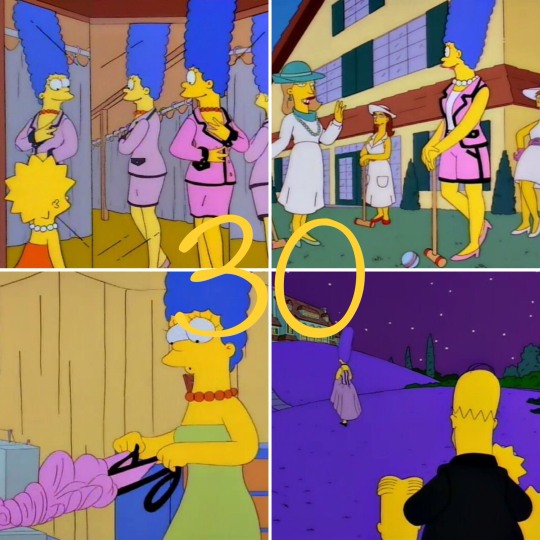
Scenes From a Class Struggle In Springfield
Defining Quote Homer: You kids should thank your mother. Now that she’s a better person we can see how awful we really are.
The whole “be yourself” narrative is common for a reason - it’s versatile, it’s easy to inject conflict, and it’s nearly always true. This here episode is a prime example, and tackles the ever-relevant topic of social class in the process. Marge finds a bargain-priced Chanel suit at a charity shop and, after a chance meeting with an old school friend, is invited to a swanky country club. Despite the fact that the group of socialites she’s landed with are a combination of clueless, malicious and boring, she desperately wants to earn their respect. She talks about recipes and the rewards of self-reliance; they talk about microwaving soup and getting the maid to clear up the resulting mess. She loves her chance-discovery of a Chanel suit; they have too much to be grateful for what they have. It’s a superb send-up of the hollow idealisation of wealth. Nonetheless, fitting in clearly means a great deal to Marge, to the extent that she begins to resent her family. The effort of trying to “fit in” is completely exhausting, and when she accidentally destroys her suit by altering it for the dozenth time, her irrational obsession with social status reaches breaking point. Meanwhile, Homer proves to be a natural golfer and wins a tournament against a far-too-proud Mr Burns laughs ensue. Not only are the jokes funny throughout, they often make sharp points. Who couldn’t be admire Lisa’s mischief when she declares “I’m going to ask people if they know their servants’ last names - or in the case of butlers, their first.” Marge does indeed learn to “be herself”, but most importantly, she realises that this isn’t a compromise. Extravagance made no one happy, not even the rich snobs, and in the modern era when extreme wealth is causing more problems than ever, that’s a worthy lesson to learn.
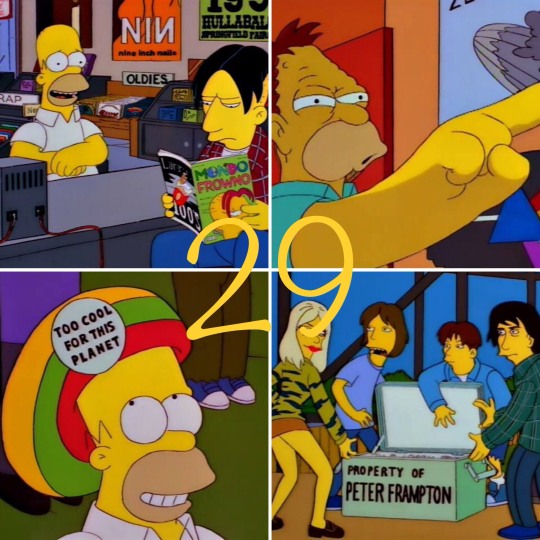
Homerpalooza
Defining Quote Abe Simpson: I used to be ‘with it’, but then they changed what ‘it’ was. Now what I’m with isn���t ‘it’ anymore and what’s ‘it’ seems weird and scary to me. It’ll happen to you.
There’s a bit in the David Lynch film ‘The Straight Story’ in which a group of polite young whipper-snappers ask the elderly protagonist “What’s the worst thing about being old?” He replies “Remembering when you were young.” Even though Homerpalooza guest stars a bunch of the very best and most influential musicians of the 90s (and Peter Frampton), this isn’t really about music. First and foremost, it’s about letting go of youth. The acknowledgement that you’re a fragile person-of-a-certain-age is a hard lesson to learn, and the pursuit of being cool is a giant obstacle to this. After being told by his kids that he has “the worst lamest taste in music ever” Homer buys them all tickets to the Hullabalooza music festival to prove that he is indeed “with it”. At some point he gets blasted in the stomach by a giant model pig (who hasn’t?), which prompts the on-site Freak Show to talent-scout him as “a big fatso we can shoot with a canon”. Despite the obvious and worrying dangers to his health, Homer perseveres because it wins him attention and respect, especially from Bart and Lisa. It’s something of an unhelpful cliche being told that you’re definitely going to become “lame” and “uncool”, but then again, being cool is not a substitute for being kind or interesting. That knowledge comes with age. Ok that’s the po-faced philosophising out of the way. No one watches this episode for that reason. They watch it because Cypress Hill attempt to play Insane In The Brain with the London Symphony Orchestra, Sonic Youth steal Peter Frampton’s watermelon and, dude, Otto’s shoes are talking to him! It’s also fitting that the episode is well and truly stolen by its least cool guest. Peter Frampton is one of the flat-out funniest non-actors to ever appear on the show. “Do you FEEL? Do… do you FEEL… Oh, come on, DO. YOU. FEEL…!”
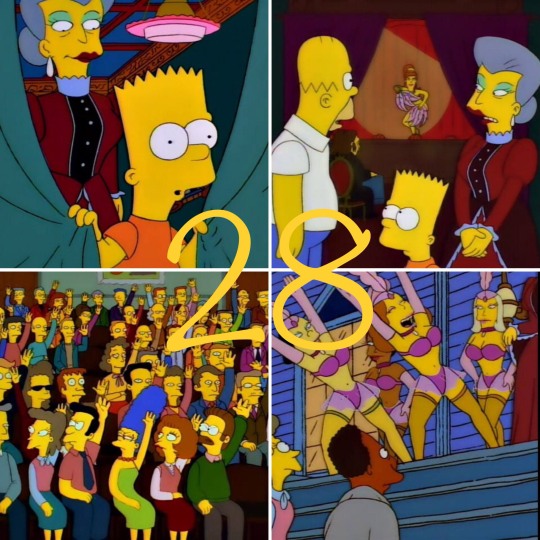
Bart After Dark
Defining Quote Principal Skinner: I was only in there to get directions on how to get away from there.
And today’s topic, boys and girls, is “shame”. After trying to retrieve a remote control aeroplane from the roof of a creepy posh house, Bart falls and damages a valuable stone gargoyle. Marge and Lisa are away scrubbing the oil off rocks (all the cute animals had been reserved for celebrities), so Homer tells him to do chores for the owner as a punishment. What Homer doesn’t know is that the house is a private gentlemen’s burlesque club and Bart proves to be an exceptionally useful member of staff. Bart After Dark is supreme comedy and pokes fun at uncomfortable truths that really needn’t be uncomfortable at all. We may be more permissive and unabashed about sexuality these days, but there is still an alarming proportion of “respectable” people hell-bent on denying a harmless facet of human nature. The people who work at the club enjoy their jobs and the clients certainly enjoy their time there. (Incidentally, it’s really nice to see Bart take pleasure and excel at tasks he’s actually been asked to do.) The obstacle arrives in the form of Marge, who becomes an emblem of so-called “moral outrage” for the duration. Like Roy Cohn punishing queers in the Lavender scare, everyone who rallies against the Maison Derriere is motivated by their own guilt and shame, until it all comes crashing down in perhaps the greatest single musical number The Simpsons ever laid down: ‘We Put The Spring In Springfield’. Oh to count the ways that this song is wonderful. It’s exactly as silly, harmless and joyful as sexuality should be portrayed, and when the whole town joins in and the song ends with a burp from Barney, the scandal has evaporated. As Homer so wisely observed “We could tear this house down, but we’d be tearing down a part of ourselves.”
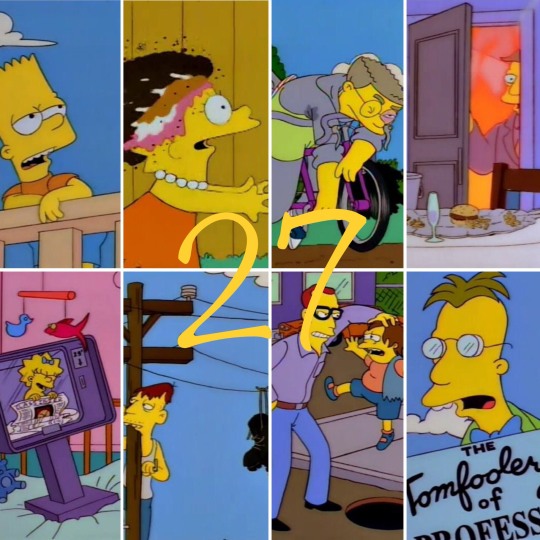
22 Short Films About Springfield
Defining Quote Bart: There’s just not enough time to hear them all.
What you’re watching here is the start of a colossal missed opportunity. The legendary ‘22 Short Films About Springfield’ (which includes our generation’s Dead Parrot Sketch ‘Steamed Hams’) was such a success that the show-runners seriously considered using it as a template for a spin-off show called simply ‘Springfield’. It would have been great, right!? I’m serious! By drifting away from the core family in a more episodical character-of-the-week format, they might have been able to retire the original show in its prime and have more potential for non-stale jokes and storylines. How about that, folks? Well, here in the real world, this superb melting-pot of vignettes was as close as we got. True, Apu’s story ‘The Jolly Bengali’ is about as racially uncomfortable as the show ever got, and it’s the only episode in the classic seasons to play the threat of rape for laughs (it’s ok because they’re men…?). Nonetheless, ‘22 Short Films’ has so many classic moments it’s almost impossible to provide a fitting summary. Instead, here are some fun facts:
- Principal Skinner’s “steamed hams” story consists of thirteen interconnected lies.
- When shouting at Smithers, Mr Burns uses accurate 19th Century slang terms.
- This is the only episode in which Bumblebee man is seen out of costume. - A scene with Lionel Hutz was dropped and is lost to history.
- The very tall man is a caricature of staff writer Ian Maxtone-Graham who is 6 foot 8.
One last thing, I declare the “very tall man” the most victorious character in any show. He turns up out of nowhere, delivers a righteous and ritualistic act of vigilante justice to a character who’s deserved it since season one, all in front of a crowd of hundreds of people, and is never heard from again. Well done, sir.
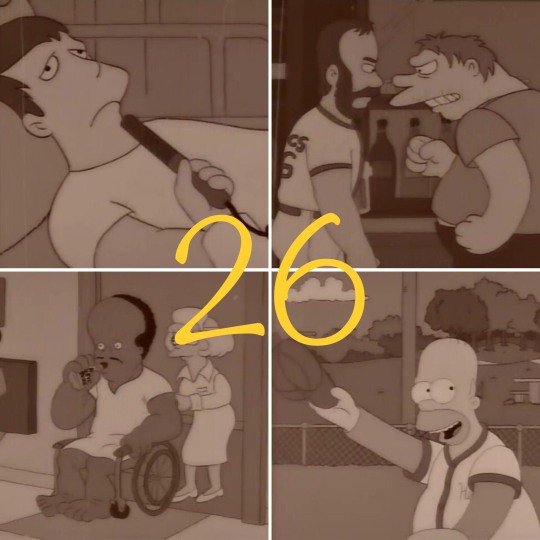
Homer at the Bat
Defining Quote Mr Burns: Smithers, there's no way I can lose this bet unless, of course, my nine all-stars fall victim to nine separate misfortunes and are unable to play tomorrow. But that will never happen. Three misfortunes, that's possible. Seven misfortunes, there's an outside chance - but nine misfortunes? I'd like to see that.
It’s a real treat when we witness bumbling boob Homer actually excel at something. Here, that “something” is the power plant softball team, who ascend the ranks alarmingly fast thanks to Homer and his homemade “Wonderbat”. Unfortunately, their success attracts the attention of Mr Burns who puts a million-dollar bet on his team and decides to play dirty. He enlists nine pro-league baseball players, gives them token jobs at the plant and adds them to the line-up. It’s a real feat that the creative people behind the scenes managed to give a wide array of guest stars (none of whom we recognise in this country) such vivid personalities. These were actually based on the writers’ experiences interacting with them. For instance, they were very taken with Mike Scioscia, whose kind nature and enthusiasm for the show is reflected in his down-to-earth and endearingly funny persona. (Referring to the episode, Scioscia once said in an interview “Every year I get a residual cheque for $4. I cash them. I don’t want to mess up their accounting department.”) Meanwhile, a very intimidating and unpleasant Jose Canseco asked for his role to be “more heroic”, so they made him spend half his screen-time slavishly unloading a woman’s possessions from a burning building. (It’s hilarious and he didn’t like it - mission accomplished.) Baseball isn’t something we in England know much about, but in this case, as with all great sports stories, you don’t have to. It’s relentless genial knockabout fun from start to finish. It’s surprisingly detailed too. For example, every time someone is whistling or humming or playing in a band, the melody is a variation on either ‘Take Me Out To The Ball Game’ or ‘We’re Talkin’ Baseball’. The long and the short of it is that Homer’s really good at something, everyone rallies around him, they hold him up when he becomes the underdog, he wins the game by accident and everyone loves him. Despite having nine separate guest stars (ten if you count the singer in the closing credits), ‘Homer at the Bat’ is one of the simplest episodes and the result is uncomplicated joy.
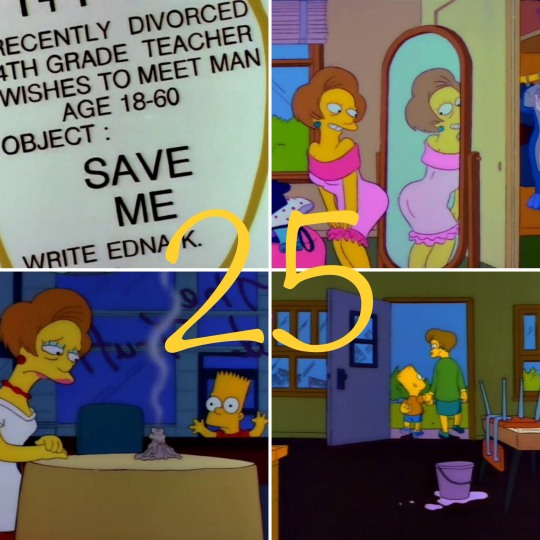
Bart The Lover
Defining Quote Edna Krabappel: Bart, you’re the closest thing to a man in my life - and that’s so depressing I think I’m gonna cry.
In its classic era, The Simpsons was a show beloved by kids and grown-ups for different reasons, but it never patronised either audience. In the case of this very-underrated-episode-indeed, we see Bart introduced to a raw, vulnerable slice of adult life and mistaking it for fun and games. After he smashes her fish tank with a yo-yo trick, Bart is given a long period of detention from Mrs Krabappel. However, when she leaves the room, he rummages in her desk to find that Edna has posted a personal ad in the Lonely Hearts section of the local paper. Adopting the pen-name “Woodrow” he begins an intimate correspondence with her as an act of combined boredom and revenge, taking inspiration from old colourised movies, a drunk postcard sent by his father and eavesdropping on her conversations. Eventually he schedules a date and, ready to laugh at her misfortune, Bart is instead confronted with the reality of adult loneliness - a sobbing desperate woman with no hope left. Bart is forced to acknowledge the cruelty of his mischief and the family bands together to write a final letter and set things straight. Aside from a gigglesome sub-plot involving a dog-house, a swear-jar and some “damn vegetables”, this is one of the most emotionally heavy episodes in the canon. ‘Bart The Lover’ won Marcia Wallace an Emmy for her portrayal of Edna and goddamn does she deserve it. The sound of her crying in the restaurant is overpowering all by itself. Not everyone gets exactly what they want by the end, but Bart gains a new sense of empathy with his teacher, as does every child watching the show. Nonetheless, it resonates loudest and truest for adult viewers. Anyone who’s ever woken in the night holding their own hand - this is yours.
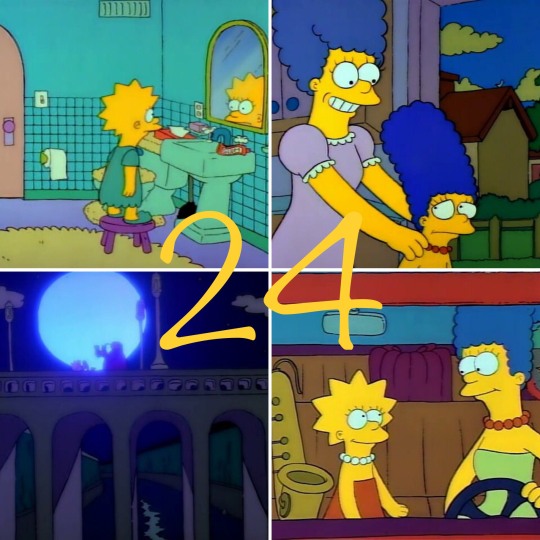
Moaning Lisa
Defining Quote
Lisa: I'm just wondering what's the point? Would it make any difference at all if I never existed? How can we sleep at night when there's so much suffering in the world?
Ay Caramba - it’s season one! Yes, this is absolutely the only entry from The Simpsons’ first lap around the track - a time when the actors all sounded like their mouths were full of felt, the animation was slightly grotty and the writers barely had any idea what they were doing. Seriously, can anyone watch ‘Homer’s Odyssey’ and explain to me what the hell that was actually about? That being said, amongst the muddled majority, a few episodes soar, none higher than this one. ‘Moaning Lisa’ is where The Simpsons hit a stride that would last for nine splendid years. Struck by an all-consuming existential depression, Lisa becomes a source of worry for her family. She sees no way out until the sound of a distant saxophone wafts through her bedroom window. She follows it and finds a musician called Bleeding Gums Murphy hanging out on a moonlit bridge. The pair jam and talk as equals until Marge comes to take her home. What’s really striking about this episode today is how optimistic it is about “the youth”. Marge’s advice to Lisa is to put on a big smile and disguise her feelings so people will like her, since that’s what she was taught by her own mother. “Before you go out that door, let’s put our happy face on - because people know how good a mommy you have by the size of your smile!” Effectively, this is the writer staring down the lens and saying “Just because your parents said it, doesn’t mean it’s right”. Art is a method of breaking down a dishonest and stale way of life and it proves to be Lisa’s saving grace - well, that and Marge’s change of heart and she yanks her back into the car: “Lisa, I apologize to you, I was wrong, I take it all back. Always be yourself. You wanna be sad, honey, be sad. We'll ride it out with you and when you get finished feeling sad, we'll still be there. From now on, let me do the smiling for both of us.” Emotions can be complicated and unmanageable to the point of death, literally. ‘Moaning Lisa’ doesn’t have any answers, per se, but answers don’t come from 20 minutes of TV. Instead we witness Lisa on the verge of developing an outlet, and a technique for surviving the world. These things are never perfected, but they have to start somewhere. For Lisa, they start here. An exceptionally soulful piece of work. Oh and Homer and Bart play a boxing video game which is also quite good.
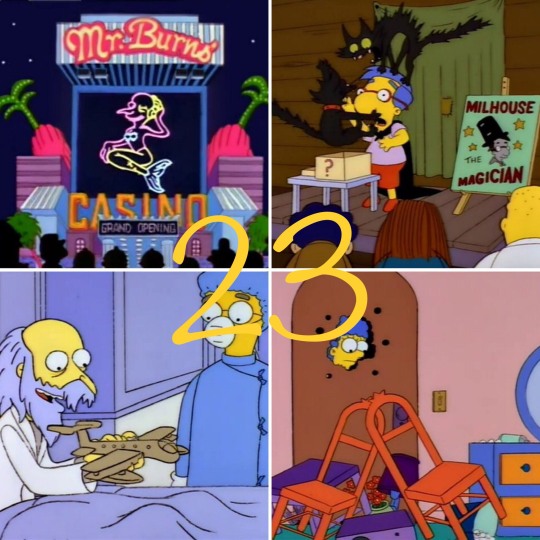
$pringfield (or How I Learned To Stop Worrying and Love Legalised Gambling)
Defining Quote Mr Burns: It’s got to have sex appeal and a catchy name…
Well, it’s right there in the title. Springfield legalizes gambling. This could have been an opportunity for some skewering satire about extravagance, casinos and exploitation of the gullible and vulnerable. Maybe it is a little, but… pfffft. Who cares. This is the episode with the boogeyman, Lisa’s “Floreda” costume, Homer’s photographic memory, Bart hijacking Robert Goulet, “Fresh’n yer drink guv’na”, Henry Kissinger’s glasses and Homer’s homemade breakfast. Having said that, absolutely none of this compares to Mr Burns’ Howard Hughes-style germaphobic breakdown. That’s the sort of thing that’s only funny if it’s done right, and on this episode, absolutely nothing is wrong.
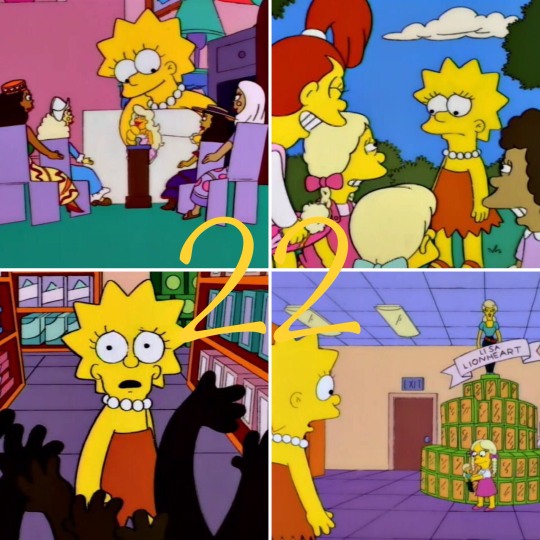
Lisa vs Malibu Stacy
Defining Quote Lisa: Millions of girls will grow up thinking that this is the right way to act - that they can never be anything more than vacuous ninnies whose only goal is to look pretty, land a rich husband and spend all day on the phone with their equally vacuous friends talking about how damn terrific it is to look pretty and have a rich husband! Bart: ...Just what I was gonna say.
Look, there are a lot of Lisa episodes on this list ok? She’s not the funniest character but she’s probably the best. I wanted to be her. I still want to be her. Her defining characteristic is her sense of moral principle, and while this would get very tiresome and ham-fisted in later seasons, that’s not the case here. On a visit to the toy store, she brings home the brand new talking Malibu Stacy, only to find that the doll’s pre-recorded phrases have a distinct sexist slant to them: “Let’s bake some cookies for the boys”; “Thinking too much gives you wrinkles”; “Don’t ask me, I’m just a girl”. After failing to make an impression with either her friends or the Malibu Stacy executives, she takes her complaint directly to the doll’s creator, played by the husky whiskey-matured voice of Kathleen Turner. She and Stacy Lavelle then develop their own talking doll, “Lisa Lionheart”. Their passion project is effortlessly squashed by the Malibu Stacy company, as big business does (“But she’s got a new hat!”). All seems lost until a little girl picks up a Lionheart doll and Lisa realises that she may still have made a difference. Once again, this saw The Simpsons addressing kids and adults without patronising either. I first became aware of the concept of casual sexism purely through watching this episode, and the value it places on small moral victories is refreshing even now. There will always be times when we see something wrong or missing within the world, and when complaining doesn’t work, the solution is to create an alternative. You won’t change everything, but you’ll change something. Also, gotta love Smithers’ screensaver.

You Only Move Twice
Defining Quote Hank Scorpio: Nice work, Homer! Boy, am I proud of you. When you get home, there’s gonna be a new storey on your house.
Look, I get it. It’s everyone’s favourite. And it’s a fine favourite to have. All 50 of the ones on this list are good favourites to have, as are about three dozen other episodes that aren’t here. Just because it’s number 21, doesn’t mean it’s not a ten. Regular guest star and future widowed clownfish Albert Brooks makes his finest appearance ever as genial boss and secret Supervillain Hank Scorpio. Apparently a lot of his dialogue was improvised for this so we can only dream of the gold that was left on the cutting room floor. What with Homer’s combined competence and obliviousness, circular discussions about hammocks and moccasins, Marge drinking a glass of wine(!) and - lest we forget - Hank’s cream and sugar, ‘You Only Move Twice’ is almost boringly perfect. It’s not like you need to think much about it. Everything’s been said. Any time spent reading or thinking about it is time you could have spent watching it. Now go away.
5 More Honourable Mentions
- Who Shot Mr Burns part 1 & 2 Perhaps the peak of the show as a cultural phenomenon. For a season finale and subsequent season premiere, The Simpsons turned itself into a great little murder-mystery with Mr Burns crossing a thoroughly unpleasant line - and betting shops giving odds on the killer’s true identity. Then they found out it was the baby. Okie dokie. And there’s a minute-long Twin Peaks-themed dream sequence! My greatest ever animated TV show referencing the greatest ever non-animated TV show? Christ, why wasn’t this on the list. Oh yeah, because it was the baby.
- The Boy Who Knew Too Much Bart is the only witness to a possible crime but can’t come forward without revealing that he skipped school. This one’s a laugh riot, especially spoilt socialite Freddy Quimby, and Skinner’s transformation from Terminator-esque “non-giving-up school guy” to Homer’s hen-pecked room-mate.
- Radioactive Man Comic book hero Radioactive Man is getting his own movie and Springfield has been chosen as the filming location. Arnold Schwarzenegger stand-in Ranier Wolfcastle is on top form, as is an extremely put-upon Milhouse in the role of Fallout Boy (and yes, the band name comes from this episode).
- Grampa vs Sexual Inadequacy Grampa comes up with a homemade and devastatingly effective aphrodisiac drink and goes into business with Homer. It’s always nice to see a show making sex as silly as it is, but the real payoff comes from Homer and Abe confronting a hailstorm of daddy-issues. Also, someone finally bought a copy of Al Gore’s book! This calls for a celebration!
- Natural Born Kissers Speaking of sex, Homer and Marge are losing their libido and find an unexpected thrill in the fear of getting caught. Like Homer’s Enemy, this is a great episode that also signalled a death-knell for the show. By confronting this risque issue, it was clear that they were running out of conflicts to invent, but as it stands, it’s a real treat, and refreshing in its brazenness.
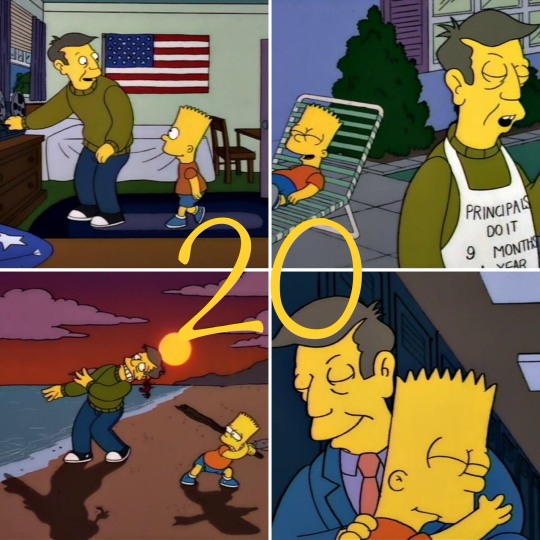
Sweet Seymour Skinner's Baadasssss Song
Defining Quote Principal Skinner: I’d like one with two seats, I’ll be dining with a friend tonight.
The chalkboard gag for The Simpsons’ 100th episode was “I will not celebrate meaningless milestones”. To further underscore this, ‘Sweet Seymour Skinner’s Baadasssss Song’ is one of the most low-key and subtle stories they ever turned in. Rather than produce a spectacle, they shone a much-needed spotlight on one of the show’s most interesting characters. Bart brings his dog into school for show-and-tell and gets an ecstatic reception from kids and staff alike. Unfortunately, Santa’s Little Helper finds his way into the air duct system which - combined with a greased-up Willy and an ill-timed visit from Superintendent Chalmers - ends up getting Principal Skinner fired. After a few chance meetings outside of school and a guilty sense of duty, Bart accepts Skinner’s invitation to his home. Much like his fake romance with Edna Krabappel, this episode sees Bart glimpsing the inner life of an adult, and though the result is a lot less dramatic, this ends up working in its favour. It takes a special lightness of touch to make these two believable companions. Neither Bart nor Skinner is pretending to enjoy themselves - they like hanging out and it’s just lovely to watch. Speaking of “lightness of touch”, replacement Principal Ned Flanders is causing total anarchy with his lack of discipline and over-optimism, and it becomes clear to Bart why the school needed an uncool law-enforcer. Despite every other character finding him boring, Skinner is one of the richest presences in the show, and this is where he really takes flight. We see him unselfconsciously air-conducting to Beethoven’s 5th, finding an uncomfortable self-awareness as a fusty square after rejoining the army, and even showing an intriguing streak of queerness. Skinner: How do I get out of the army? Bart: No problemo - just make a pass at your commanding officer. Skinner: Done and done. And I mean “done”. When the pair reassume their roles as Principal and student, it’s exceptionally bittersweet. It’s hard to imagine Skinner having any friends at all, and it’s not like Bart is used to having such an even-handed relationship with an adult. In the end, their rivalry is unavoidable, but thanks to this episode, it has an indelible shadow of poignancy too. Hardly a meaningless milestone.
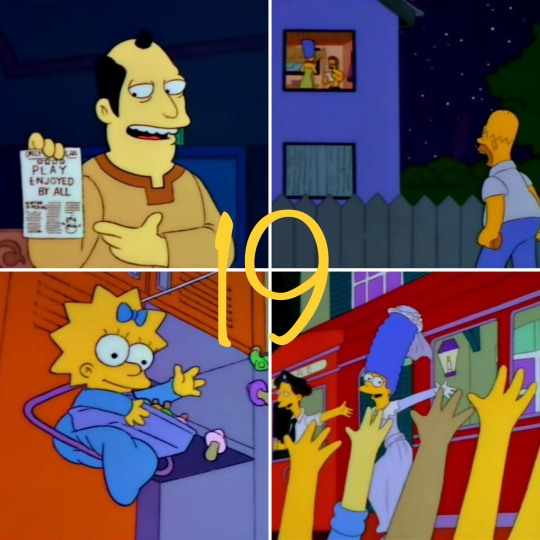
A Streetcar Named Marge
Defining Quote Llewellyn Sinclair: “I have directed three plays in my career and I have had three heart attacks. That's how much I care - I'm planning for a fourth.”
As long as there are amateur dramatic productions making a good-natured mess of classic literature, comedy will never die. To escape her unappreciated baby-focused home life, Marge auditions for a musical version of A Streetcar Named Desire and wins the female lead. For better or worse, the play becomes a magnifying glass into Marge’s relationship with Homer which is hitting something of a low-point. Fair play, too. Homer is an utter boob in this episode - impatient, demanding, selfish, annoying and deluded. Anyway, Homer sees the play, it goes really well and he finally understands that he needs to make more effort and that he loves her. The end. Lovely stuff. Anyway, let’s talk about Jon Lovitz, the voice of Artie Ziff, Jay Sherman, Professor Lombardo and, of course, Llewellyn Sinclair, the most passionate caftan-wearing am-dram director in the world. The improvement he makes to whatever episode he’s in is very noticeable. In this case, we’re treated to a 2-for-1, since he also plays Llewellyn’s sister, proprietor of Maggie’s day-care centre The Ayn Rand School For Tots. This might be Maggie’s finest hour - a Great Escape-esqe heist against a fascist nanny? Yes please. However, the real peak comes from the musical itself. “Can’t you hear me yell-ah, you’re puttin’ me through hell-ah, Stella”; “New Orleans!”; “Oh, what’s a paper boy to… dooooooooooooooooooooooooooooooooooooooooooooooooooooooooooooooo?” Charming, silly, catchy and missing the point of the source material spectacularly - ‘Oh! Streetcar!’ is one of the finest musical moments in a show already chock full of them. Also! You WILL want sPEAK with the exACT intensity of Lllllewellyn Sinclaiirrr, for the REST of your LIFE.

Marge Be Not Proud
Defining Quote Marge: I always thought I understood my special little guy, but somewhere along the road his hand slipped away from mine.
Boy, did this one make a dent in our collective souls. An autobiographical episode from writer Mike Scully, Bart is caught shoplifting a video game and goes to great lengths to conceal his crime from his parents. All seems well until the family go to the same store to get their Christmas picture taken. The store detective shows them the CCTV tape and all illusions are gone. Ouch. Parents and children will break each other’s hearts hundreds of times over, some worse than others. Before this episode, we’d already had six and a half seasons of Bart being a cheeky menace, but this one-step-too-far shatters Marge’s perception of her son, causing her to withdraw her affection and become distant. No one cries in this episode, and it might be less powerful if they did. Instead Bart is left with a chilly ambivalence, and sorely missing the “mothering” which he was “too cool” or “too old” to put up with before. He even asks Milhouse’s mother if he can hang out with her while she does “mom stuff”, culminating in his almost-funny request: “Tell me I’m good?” Trust The Simpsons to take a story this sad and make it this funny. Milhouse (now known as “Thrillho”) is an splendid dweeb as always, Homer buys a fridgeful of eggnog (“We only get 30 sweet noggy days til the government takes it away again!”) and, of course, the towering chain-smoking store detective himself, Don Brodka. Easily one of the strangest one-off characters in the classic seasons, his off-the-wall intimidating personality can be attributed to his off-the-wall intimidating voice actor, Lawrence Tierney. A veteran film-star, Tierney turned up drunk, shouted at staff, tried to record lines in a Southern accent and refused to read anything if he “didn’t get the jokes”. Nonetheless, the end result is memorable as hell. Of course, Bart manages to save the day with a grand, dignified and sentimental gesture and there’s not a dry eye in the house. His best Christmas present is getting his mother back, and it certainly isn’t Lee Carvallo’s Putting Challenge. “You have selected ‘No’.”
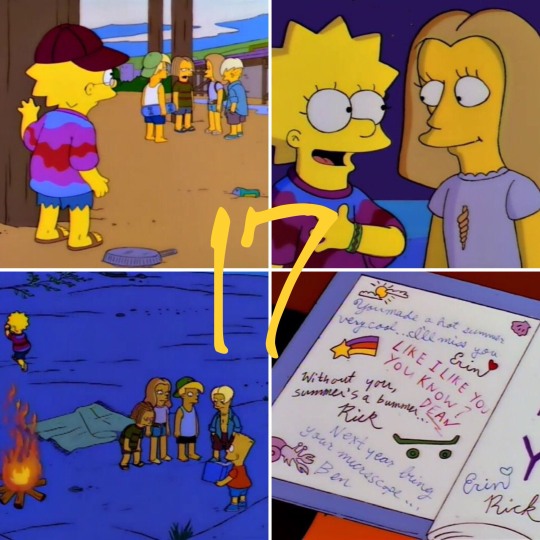
Summer of 4 foot 2
Defining Quote Lisa [internally]: A compliment! Scanning for sarcasm… it’s clean!! Go!!
The family takes a trip to stay in the Flanders’ beach-house in Pwagmattasquarmsettport (thank you, copy & paste). Having recently developed a depressing awareness of her unpopularity at school, Lisa decides to “forget” to pack so she can pick out some new clothes. Now armed with a cool outfit and a new beach-bum persona, she decides to make friends with some skater kids, and ends up having the best summer of her life. Often, episodes like this get remembered for their rich emotional core, and while ‘Summer of 4 foot 2’ definitely earns that, it’s almost easy to overlook the sheer volume of great jokes. There’s Homer’s misadventures with illegal fireworks and Flanders’ “helpful notes around the house”, but these laughs are dwarfed by Milhouse who tags along for the trip. Whether he’s describing his favourite sprinkler systems or being “the dud” in the Mystery Date board game, there’s a good chance that he’s never been funnier. Nonetheless, this is Lisa’s story and it’s one of her most heartfelt. It also shows Bart at his nastiest. Overcome with jealousy, he takes Lisa’s yearbook - filled with evidence of her status as a Teacher’s Pet - and shows it to her new friends, effectively destroying her facade. Understandably, her self-esteem reaches crisis point: “Being myself didn’t work, being someone else didn’t work, maybe I just wasn’t meant to have friends”. However, just when all seems lost, she finds her beach pals decorating the family car with seashells, bearing the message “Lisa Rules”. It’s about as sincere a gesture as anyone could make (to the point that it counts as vandalism and the family get attacked by seagulls on the way home). Even Bart redeems himself by asking the kids to sign the yearbook, where they leave her messages she can keep. The notoriously geeky Simpsons’ writers (especially from this era) probably weren’t the most popular kids in school. It’s hard not to see this episode as an attempt to reassure the dorks of the world that there’s a place for them in the world, so long as they hang onto their curiosity and kind nature.
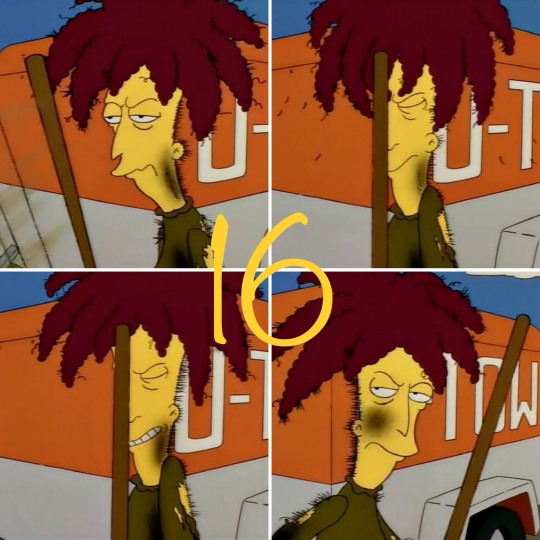
Cape Feare
Defining Quote Rake: *thwack*
In the first scene, Bart opens a letter bearing the phrase “I’m going to kill you” written in blood. If you’d never seen ‘Cape Feare’, you’d be forgiven for thinking that The Simpsons were about to go macabre - bringing the Treehouse of Horror out of the treehouse, if you will. Instead, this might be the most relentlessly silly episode in the classic canon. It’s a lot of people’s favourite and it’s very, very easy to see why. The jokes just don’t stop. Some you can file under “blink-and-you’ll-miss-it”, others go on forever and never wear out their welcome. Bart’s nemesis Sideshow Bob is released from jail and seeks revenge against the boy who got him locked away. Bob is clearly a smart man, but luck is not on his side. Despite managing to follow the family to their new home under the Witness Relocation Program, he falls foul of cacti, speed-bumps, elephants and - most memorably of all - rake after rake after rake. It’s strange to think that this legendary scene, beloved by everyone and their mum, was only added because the episode was running under the minimum length. It might be the greatest bit of last-minute padding in TV history. ‘Cape Feare’ ends with Bob singing the entirety of Gilbert and Sullivan’s HMS Pinafore - because that makes just about as much sense as everything else. It resists analysis and makes explanation pointless. Well, almost pointless. There is one thing about ‘Cape Feare’ that “makes a point”. Bob, this man who the writers torture over and over and over is a snobbish Conservative Republican and an avid defender of so-called “high culture”. These were the kind of people who embodied The Simpsons’ most vocal critics. It’s hard to know if you could call this episode “satirical” based on this, but it is safe to assume that the writers loved beating him up. It’s pure pleasure. Even singling out individual jokes is moot since by doing so you’re ignoring about eight dozen equally good ones.
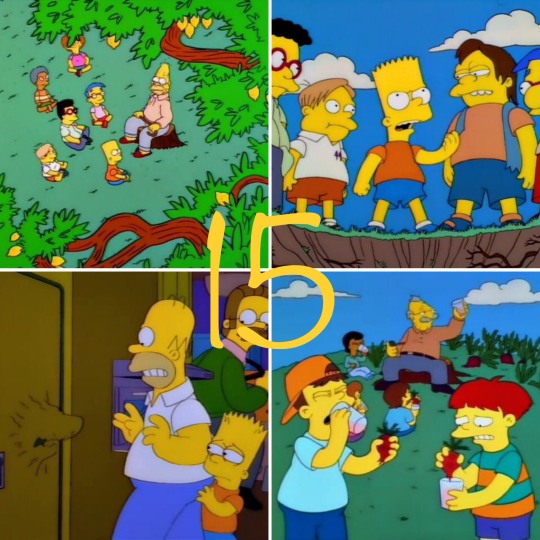
Lemon of Troy
Defining Quote Marge: This town is a part of us all. A part of us all. A part of us all. Sorry to repeat myself but it’ll help you remember.
Ok, I apologise but I really am about to bolt on some sincere armchair philosophy to this story about kids stealing a lemon tree. In an increasingly busy and international world, town pride is a neglected concept. We as human beings aren’t psychologically equipped to be burdened with this much information about what’s going on in Russia, Israel and Ethiopia etc. It makes us feel helpless when we see how little difference we can make. Meanwhile, there’s a lot to appreciate, improve and value on a more local scale. You can make a positive impact, whether it’s creating art, cleaning stuff up, volunteering, or getting back your beloved lemon tree from those cousin-marrying pricks next door. Springfield’s neighbours and rivals Shelbyville have stolen the fabled lemon tree, planted by Springfield’s founders because lemons were “the sweetest fruit available at the time”. Bart and his band of brothers set out to take it back, leading them on a treacherous trail of skateboard slopes, ravenous attack dogs, man-eating tigers, disguise kits and a lemon-shaped rock. It’s a bunch of kids rallying behind a noble cause, and when the adults catch up with them, they instantly join the team on principle. It’s one of the few episodes that qualifies as a legit “adventure story” and there’s no shortage of classic moments - the sour-faced man, the jet-pack graffiti paint and Milhouse getting ready to explode to name three. There’s a great sense of atmosphere in this one too. The tone of a golden summer’s day is baked right in, and Nelson even resists beating up Martin for the sake of the mission. Everyone’s a winner. Except Shelbyville. That turnip juice looks unpleasant.
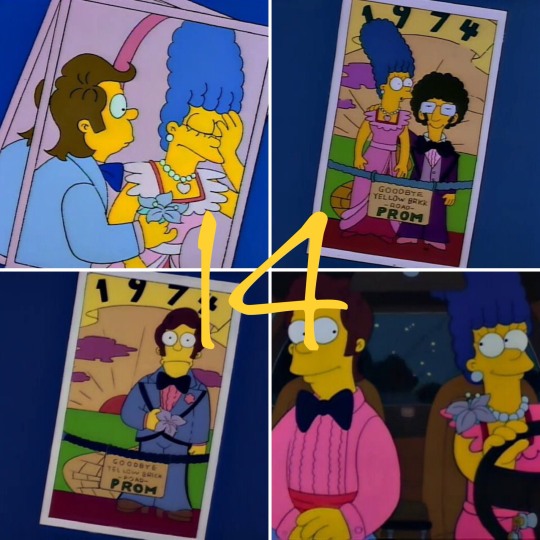
The Way We Was
Defining Quote Homer: I got a problem. Once you stop this car, I’m gonna hug you, and kiss you, and then I’ll never be able to let you go.
It’s really easy to be sentimental, but doing it well is another job entirely. Get it wrong and it’s manipulative; get it right and it might be as honest and heartening a slice of life as you can find. The story of Homer and Marge meeting falls into the latter category. In fact, it might be Exhibit A in why Homer is a sympathetic character in spite of his flaws. This episode shows him as a teenager, and quite possibly even dumber than usual. However, it’s meeting Marge that causes his heart to open, and we get to see just how much uncynical unpretentious good nature is in there. Meanwhile, Marge learns that while Homer is dim-witted, he respects her a lot more than her actual prom date. Let’s say another big friendly hello to Jon Lovitz starring as Artie Ziff - an intelligent but emotionally stunted narcissist who tries to undress Marge in the car. Artie is funny and loathsome in all the right ways. He’s a realistic respectable dork who sees women as a challenge to be conquered, despite praising Marge’s feminist attitudes. Needless to say, his downfall is very satisfying indeed. In this sense, Homer’s simple-mindedness is his greatest asset. He may have lied to her in order to spend time with her, but he was also willing to put every ounce of effort he had into becoming his best self. (If you want a very simple analogy for Homer and Marge in this episode, look at Fry and Leela from Futurama. Even Matt Groening, the man who created all four of those characters, said that the similarities are striking in retrospect.) ‘The Way We Was’ might not be a laugh-riot but it really doesn’t have to be. It’s also one of those rare instances in which a Simpsons episode plays like a self-contained short film. You don’t need any additional information about these characters in order to understand them in this moment. Homer’s pain and joy of being young and in love, and Marge’s yearning to be respected for her intelligence and kindness - you know how that feels. That line that Homer says to Marge in the car - the one at the top of this paragraph. Who wouldn’t want to hear that from someone who has earned it, and who wouldn’t want to say it back and mean it. You don’t have to be a teenager or a baby-boomer or yellow to feel it.
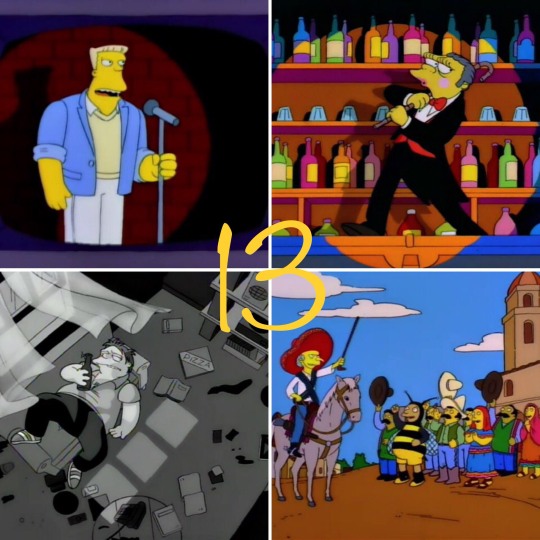
A Star Is Burns
Defining Quote Homer (internally): Hmmm… Barney’s movie had heart, but football in the groin had a football in the groin...
Hey, here’s an interesting fun fact. Notice anything different about the opening titles of this particular episode? After the family sit down and the TV displays the name of the show’s developers, Matt Groening’s name is missing. He objected to this episode so much that he demanded they remove him from the credits. What was so objectionable about ‘A Star Is Burns’? Hilarious and quotable from start to finish, and other than a one-off blip of 90s homophobia, it’s aged well too. Well, the reason for Groening’s beef was that this is actually a crossover episode. Long before The Simpsons and Family Guy joined forces for the worst man-made thing since global warming, Springfield was visited by Jay Sherman the critic, from the animated TV show ‘The Critic’. The Critic was cancelled after three seasons but it certainly has its charms - you can watch it on Youtube somewhere. Despite Matt Groening dismissing ‘A Star Is Burns’ as “an advert”, it’s one of the best episodes and you don’t need to know diddly-squat about ‘The Critic’ to find it funny. Springfield hosts a film festival to attract tourism and the locals enter their own movies in the competition. Among the many moments which devoted fans have memorised by heart include ‘McBain: Let’s Get Silly’, Mr Burns making a hideous self-tribute epic with Steven Spielberg’s non-union Mexican equivalent, and of course ‘Hans Moleman Presents: Man Getting Hit By Football’. That being said, perhaps its most memorable moment is surprisingly deep. Boozehound Barney Gumble makes a film about his own alcoholism, and while it’s funny in its own way, this is the first time we see him being self-aware. It adds a soulful and tragic depth to his character that can’t be unseen. Oh, and Jay Sherman is played by Jon Lovitz, which is a substantial net-gain for everyone.
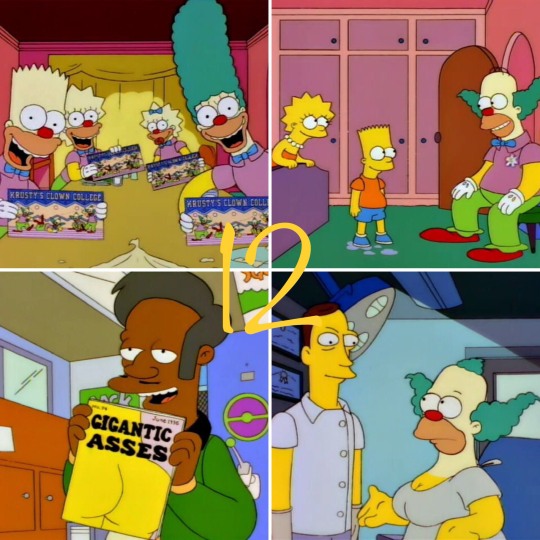
Homie The Clown
Defining Quote Legs: I’m seeing double here! Four Krustys!
This episode spent a long time cooking. Have you ever noticed that - aside from the hair, the nose and the skin colour - Homer and Krusty the Clown look identical? This was a deliberate choice. The writers initially planned to reveal that Homer was living a double-life as his kids’ favourite entertainer the whooooooole time. This was scrapped, as was the plotline of Marge secretly being a giant rabbit who hides her ears in her hair (I am 100% serious, that’s real - look it up). Instead, the Homer-is-Krusty idea birthed just one concentrated 20-minute burst of silliness. No unnecessary tacked-on pathos here - just consistent, merciless and relentless laughs. Krusty is hemorrhaging money thanks to his absurd extravagance (“Hire Kenny G to play in my elevator; my house is dirty, buy me a clean one”) and his only option is to license his name for a clown college. Homer sees the billboard for the college and - being the ultra-suggestible dimwit he is - experiences a slew of clown-based hallucinations until he signs up. He learns how to be a Krusty impersonator, does events and parties, the Mafia get involved - it’s all a rich tapestry, kids! There’s no faux-high-brow points to make or philosophy-wormholes to get sucked into here (although it is lovely to see Homer earn such pride from his kids). An episode like this is like a perfect sandwich. You know what a sandwich is, you’ve had hundreds of sandwiches before - but once in a blue-moon you bite into one and instinctively know it’s one of the best things you’ve ever tasted.
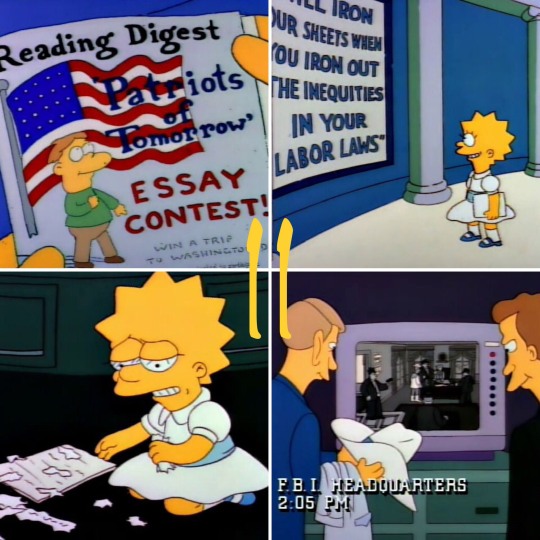
Mr Lisa Goes To Washington
Defining Quote Lisa [reading her essay]: The city of Washington was built on a stagnant swamp some 200 years ago and very little has changed. It stank then and it stinks now.
“Oh, Marge, cartoons don't have any deep meaning, they're just stupid drawings that give you a cheap laugh.” This line appears in the first few minutes, effectively disarming you in time for one of the most profound episodes. Lisa wins first prize in a patriotic essay contest and the family are sent to Washington DC for the national finals. During a nighttime visit to the statue of a niche feminist icon, she observes her congressman taking a bribe to allow the destruction of Springfield Forest. This leads her to rewrite her essay as a brazen critique of government corruption, shocking the audience and judges. Unwittingly, she also spurs action against the dodgy dealings of the congressman, who is arrested by the end of the episode. “I can’t believe it - the system works!” You could say that this portrayal is unrealistic, but a more apt word would be “optimistic”. Since the show was popular with kids and adults, this episode is both a warts-and-all portrayal of American politics, and a message to children that they have the power to change the world. If a kid tells you he or she wants to be an astronaut, you don’t say “That’s not how the world works”, you encourage them. They probably won’t become an astronaut, but if you tell them they can’t, they definitely won’t. There are people who say entertainment is purely a distraction from more important issues. That being said, entertainment isn’t going anywhere and it’s up to artists to make it useful as well as fun. ‘Mr Lisa Goes To Washington’ was engineered to be inspiring, and it is. It’s a system, and sometimes it does indeed work. (Plus, you know, it’s got jokes and stuff.) Without a shred of exaggeration, Lisa at her best is the icon the world deserves.
One last glut of honourable mentions in 6 words each
When Flanders Failed Homer’s a redeemable swine after all
Lisa’s Pony It’s the (eventual) thought that counts.
Radio Bart Polite victims are easier to help
H-O-M-R Homer boosts IQ with crayon removal
New Kid On The Block Bart gets his heart ripped out
Mr Plow That’s his name. That name again?
Selma’s Choice Breeding is not the answer, FFS.
Krusty Gets Kancelled I’ll get you for this, Midler!!!
Homer Goes To College Homer is dismayed by realistic university
Homer The Vigilante Idiocy, idiocy, idiocy, idiocy and idiocy.
Secrets of a Successful Marriage Say some gangsta’s dissin’ ya fly-girl...
Bart of Darkness Rear Window pastiche by the pool
Two Dozen and One Greyhounds Mr Burns really likes his vest.
The PTA Disbands The PTA disbands, purple monkey dishwasher
Bart On The Road The Knoxville World’s Fair was disappointing
Much Apu About Nothing Compassionate pro-immigration stance softens Apu controversy
The Homer They Fall Obligatory Rocky parody done very well
Hurricane Neddy Ned’s long overdue breakdown doesn’t disappoint
Brother From Another Series Frasier and Niles steal the show
Das Bus The silliest episode that’s still great.
Lisa The Simpson You are not your family, ok?
King of the Hill Grampa tried to eat someone! Yikes!
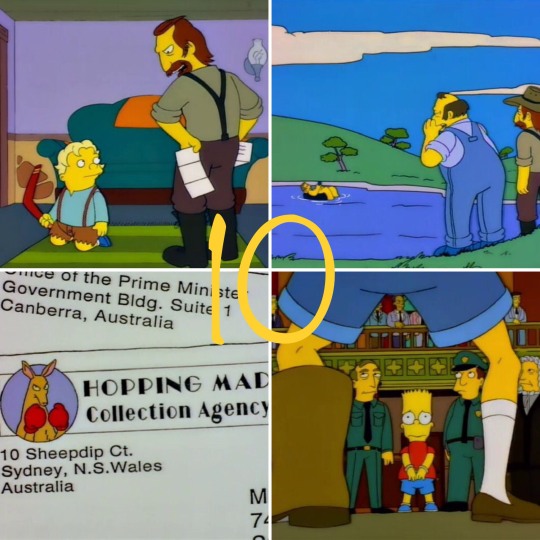
Bart vs Australia
Defining Quote Bruno: “Nine hundred dollarydoos?!”
This is how you make fun of other cultures - with as much absurdity as possible. The reaction to Bart Vs Australia was initially very negative but it’s become something of a national favourite in Australia itself - and why shouldn’t it be? If only The Simpsons’ visit to England in ‘The Regina Monologues’ was half as funny as this. (For the record I also wish Tony Blair wasn’t in it. Ugh.) In order to settle an argument with Lisa about which way the toilet water spins, Bart makes a collect-call to Australia and tricks a young boy into accepting the $900 charge. The family are then forced to take a trip there so Bart can make a public apology in front of their Parliament. That’s about it as far as plot goes. As for the jokes, they’re all winners, but it’s the style that makes Bart Vs Australia so memorable. Almost no other episode looks and sounds so distinct while being so consistently funny. The Australian accents, stereotypes and customs - from “chazwozzas” to “knifey-spoony” to “Just a lil’ kick in the bum” - are so profoundly stupid and inaccurate that it’s a miracle that it was taken so seriously. Fox received hundreds of angry letters after its initial broadcast. Fast forward to the 2010s and Australian newspaper The Age named it the funniest episode ever, and there was even a petition to change the official Australian currency to “Dollarydoos”. Time heals all wounds. That being said, I wonder what the Aussie Prime Minister thinks of this… Oi!! Mr Prime Minister!!!! ANDY!!!!!!!!

Homer The Smithers
Defining Quote Homer: Here are your messages: You have 30 minutes to move your car; you have 10 minutes; your car has been impounded; your car has been crushed into a cube; you have 30 minutes to move your cube.
Mr. Burns remains a very useful shorthand for illustrating extreme wealth. ‘Homer The Smithers’ captures him at his most unpleasant, ungrateful and feeble, which is part of the reason it’s comedy gold. Smithers takes a vacation due to stress, and chooses a replacement guaranteed to not outshine him. Obviously Homer is a perfect choice, but he tries extremely hard nonetheless, overworking himself into a state of permanent semi-conscious misery. Burns scolds him at every chance, culminating in Homer snapping and knocking his boss out cold. Burns gets some independence, Smithers gets fired, there are some scuffles, a prank phone call, some piano-moving, a grievous injury and then everything’s back to normal with a thank-you fruit basket on the table - The End. It’s a fairly straightforward plot, and these aren’t usually the ones that stick out in the mind. That being said, Homer’s good-nature combined with his magnified incompetence makes for one of the most joke-heavy episodes they ever put out. It’s breathless. It’s also a tough episode to write about. You definitely feel for Homer, but it’s not trying to make you cry or think too hard about politics or class. Any time you spend reading this could be spent watching him inserting fang-dentures or burning the cornflakes. You may as well try and right a geosocial critique of Laurel and Hardy - no one’s interested (and I don’t even know if geosocial critique is a thing that exists). However, it’s also the last “boringly perfect” entry on the list. Everything else to come is like nothing else that’s been on TV. In the meantime, watch this and make your day better.
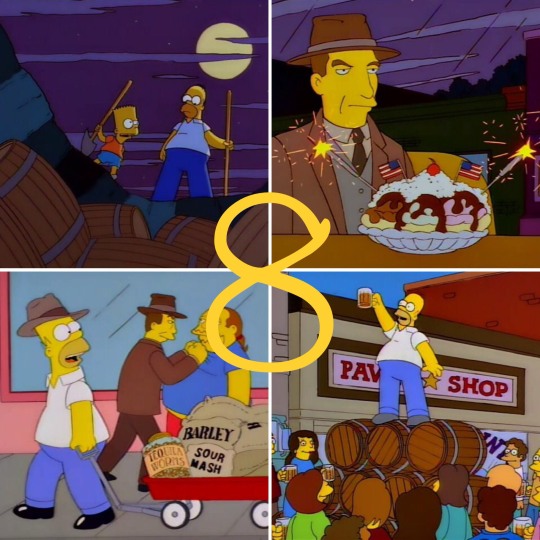
Homer vs the Eighteenth Amendment
Defining Quote Homer: To alcohol - the cause of, and solution to, all of life’s problems.
Vice will be an interesting subject forever. There will always be conflict when it comes to the likes of drugs, gambling, food, smoking and, of course - the inescapable daddy of them all - booze. Statistically, alcohol is the fifth most dangerous recreational drug to the human body (far higher than more demonised substances like ecstasy and marijuana), yet it’s so ingrained in modern Western culture that trying to get rid of it would be an impossible task, right? Well, they tried it once, and for one peerless episode, Springfield tried it again. After the annual St Patrick’s Day celebrations go awry, alcohol is banned from the town and the remaining stocks of beer are taken to the dump and buried. Thanks to organised crime, Moe’s Tavern turns into a secret speakeasy (I mean “pet shop”) right under the nose of new police chief Rex Banner. Banner is a real treat - a humourless brown-clad cop who speaks in early 20th Century slang. His lines zip from outdated incomprehensibles (“Is some blind tiger jerking suds on the side?”) to extremely square after-school-special advice (“Baby turtles and alligators may seem like a cute idea for a pet… but they grow up.”) That being said, the episode doesn’t fully take off until the mafia’s import routes are cut off and it’s up to Homer to keep the drinks flowing. He exhumes the beer from the dump and imports it into Moe’s using hollow bowling balls and a system of underground pipes. In the irresistible category of “Homer is really good at something” episodes, this is the best of the bunch. It’s actually exciting and you’re rooting for him all the way, even when he starts brewing explosive gin in forty-two bathtubs. Plus it’s straight-up lovely when Homer and Bart team up for some righteous rule-breaking. It’s one of the most ambitious concepts the show attempted and it succeeds as a cinematic parody, a light-hearted history lesson, a philosophical chin-stroke and a continuous laugh riot. Oh wait, I forgot one thing - he filled the bowling balls with a funnel.
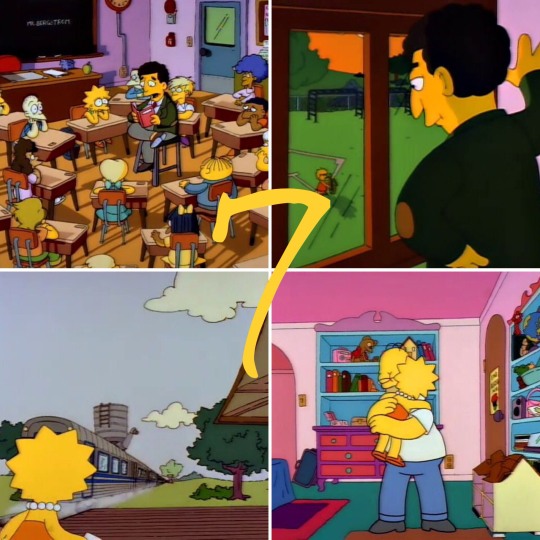
Lisa’s Substitute
Defining Quote Mr Bergstrom: “Goodbye, Lisa honey! It’ll be ok! Just read the note!”
I’m gonna get personal for a moment because there aren’t any other ways of talking about this episode. When I was eight, my teacher was ill for a week or so and a substitute was called in. His name was Mr Platt - probably mid-50s at the time, stern gaze, bushy eyebrows but great sense of humour. At one point I was talking at the back of the class and he shouted “YOU!”. I was expecting a bollocking but he decided to throw a curveball and asked me what music I liked instead. I said I liked “60s music” and his eyes lit up. (I also liked the Backstreet Boys but I failed to mention that.) He kept me back after school, gave me questions to answer and bands to research. He had a big impact on me. He didn’t talk to me like a kid, and he encouraged me to be inquisitive about my interests. I really wish I knew where he was because I have a lot to thank him for. Being a child is a scary time. You need to know that there’ll be a place for you when you grow up, especially when you start noticing what makes you different. When Miss Hoover is sick, her class is taught by substitute teacher Mr Bergstrom. Openly sensitive, funny, and passionate about learning, Mr Bergstrom is the father-figure Lisa feels she needs to nurture her gifts, and with whom she shares a profound mutual bond.
Mr Bergstrom: You’re gonna miss your brother’s antics. Lisa: When? Mr Bergstrom: When? When your life takes you places the rest of us have only heard about. Lisa: Place where my intelligence will be an asset and not a liability? Mr Bergstrom: Yes! There is such a place!
He’s also a far-too-vivid contrast to her own father. Fitting in is hard work, whether it’s at school or at home, and neither of these are easy for Lisa. This is mostly her story, but Homer eventually earns the spotlight too, gaining new depth and empathy in the last few minutes of the story. That being said, there’s no overshadowing the goodbye scene at the train station. Nothing. Some people arrive from the outside world, reshape your life for the better, and then are gone forever. They exist. There’s a place in the world for everyone. If we stop believing that, then we stop trying. As Lisa finds out, there are reasons to keep trying.
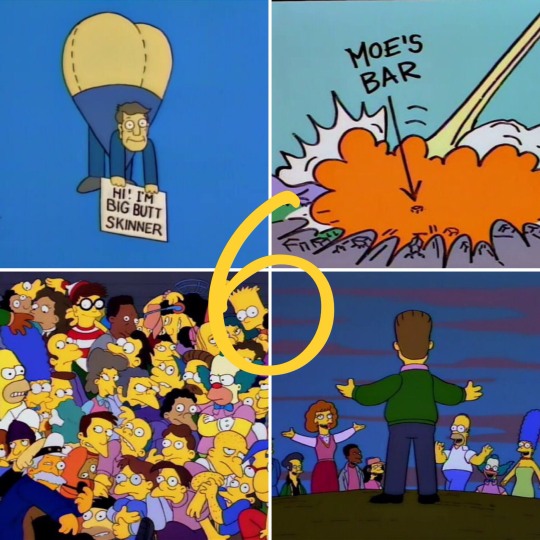
Bart’s Comet
Defining Quote Moe: Hey Homer, wait up, I wanna die too!
I’m terrified of Armageddon. Constantly. Call it an unwelcome obsession. It’s the state of mind that makes me smoke cigarettes, lie awake all night and fail to concentrate at work (where do you think I write all of these?). Amazingly, The Simpsons found a way of covering it. ‘Bart’s Comet’ is dark existential comedy at its most accessible, complete with a weather balloon with a big bum on it. Bart is given an extended detention, sentenced to help Principal Skinner with his amateur astronomy. He ends up discovering a comet by accident, which appears to be heading towards Springfield at a fantastic speed. Professor Frink devises a way of destroying it with a rocket, but the missile sails off course and destroys the only bridge out of town. Mass hysteria ensues. This episode was penned by the show’s most respected, reclusive and prolific writer, John Swartzwelder. He’s such a confounding character that some people literally doubt his existence. The only thing resembling an interview is a DVD commentary, during which Mike Scully telephoned Swartzwelder and recorded him without his knowledge. Most accounts of him describe a cantankerous, angry, conservative-libertarian gun-nut who loathes environmentalism, but who knows how much of this is true. Either way, it’s bizarre to think that a man with such a cartoonishly prickly reputation could write something with so much heart. It’s also bizarre that anyone could make this subject so funny. The scene in the cramped bomb shelter is one of the best set-pieces in comedy. By the end, the townspeople’s cut-throat dog-eat-dog mentality gives way to graceful resignation, singing Que-Sera-Sera on a hillside as they wait for death. Even though all’s well in the end, it’s hard to think of a more troubling or a more beautiful moment within the show. The fear of “the end” is often more than I can cope with and I’m not all that brave. That being said, this episode offers some kind of grounding - the chance that there might be more songs to sing is a reason to stay for the time being. Hell, it might yet show me how to die. Also, it turns out that Santa’s Little Helper and Snowball II sit on the couch together and secretly watch Lassie when everyone’s asleep! How charming is that!
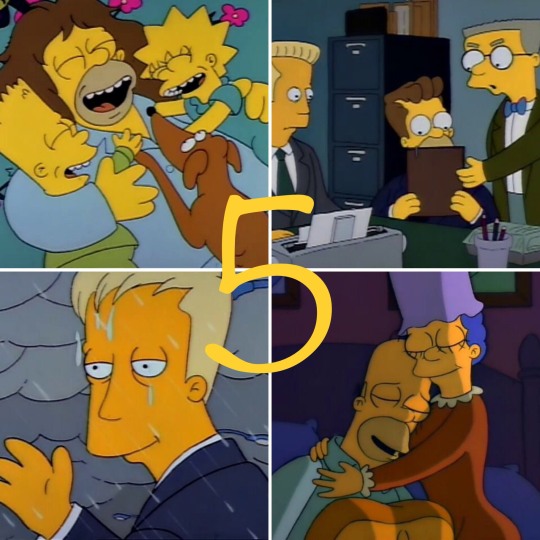
Simpson and Delilah
Defining Quote
Karl: A man’s suit should make him feel like a prince. It should cry out to the world “Here I am. Don’t judge me, love me!”
The way a TV show looks carries subliminal connotations. For instance, live TV uses a high frame-rate with a sharp picture because it’s easier to edit, but if you used this on Downton Abbey it would instantly appear cheap and disposable. This gets even easier to notice when you start talking about animation. From the start, The Simpsons didn’t look like a show for adults. It’s a cartoon, their skin is yellow, there’s a natural grotesqueness about it. Nonetheless, the writers were very ambitious and keen to challenge the audience’s expectations, whether through smart political satire, or a faithful re-telling of Edgar Allen Poe’s The Raven. In other words, they were adamant that it was not “just” a cartoon show. ‘Simpson and Delilah’ is one of the very best examples of this. It’s actually one of the most subtle episodes, but also one of the boldest, with an emotional core as pure as it is complex. Homer stumbles across Dimoxinil, a “Miracle baldness cure” that actually works. He charges the treatment to his workplace health insurance, and one sleep later, he wakes up with a full head of hair, more confident and happy than he’s been in his life. His new look and attitude is noticed by his boss Mr Burns, who promotes him to a well-paid executive position. He even gets to hire his own assistant, choosing a charismatic and confident man named Karl. And here we come to the heart and soul of the story. Played by the radiant and gravel-voiced Harvey Fierstein, Karl is hell-bent on making Homer’s life better - from hiring a singer for his and Marge’s anniversary, to providing him with a new suit to accentuate his professionalism and charm. There were some viewers who speculated, and still speculate, if Karl is gay and in love with Homer. In hindsight - DUH. Of course he is. That being said, he’s not an “issue of the week” like John Waters was in Homer’s Phobia; his sexuality isn’t hidden, nor is it a punchline. If anything, his queerness is part and parcel of what makes him so likable - a true rarity in 1990. He’s expressive of his feelings without ever overstepping his boundaries, is funny on his own terms, and is a happy, confident and dignified person who you’d love to have around. In order to make a point, he kisses Homer before a big speech, and if you remember this scene, you’ve witnessed the first man-on-man kiss on American TV. It would be 10 more years before this would happen in a non-animated form. Eventually, a suspicious (and reprehensible) Smithers finds the Demoxinil insurance forms, but Karl takes the blame before he has a chance to fire Homer. It’s not exactly a laugh-riot of an episode, and its pace is gentle, but the amount of craft and care that went into ‘Simpson and Delilah’ is both self-evident and extraordinary from start to finish. A love story with no losers, and most certainly “more than a cartoon”.
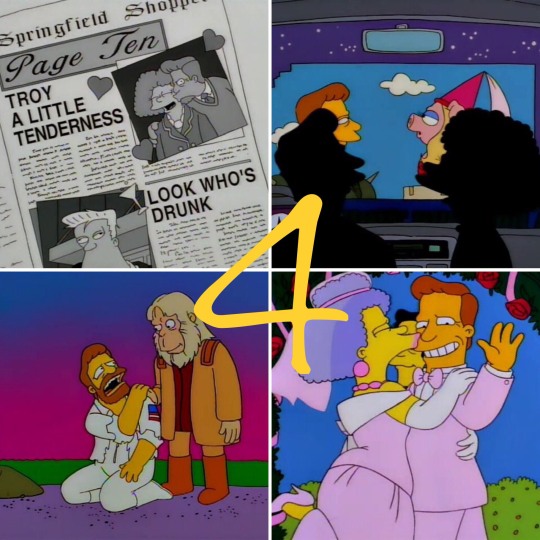
A Fish Called Selma
Defining Quote Troy: That’s right, boys! Troy’s back from the gutter, and he’s brought someone with him!
On the evening of May 27th 1998, Phil Hartman and his wife Brynn had a heated argument about her recent drug use, during which he threatened to leave her. Later that night, while under the influence of cocaine, she entered the bedroom where her husband slept and fatally shot him in the head. She killed herself some hours later. As a result of this, Hartman’s two recurring characters - crooked lawyer Lionel Hutz and washed-up film star Troy McClure - were permanently retired. Before his death, there was even talk of a full-length movie based around McClure, following his journey through rehab and subsequent career revival. Sadly, the closest we got was this. I say “sadly”. If you’re going to be the focus of only one solitary episode, it may as well be one of the best. ‘A Fish Called Selma’ is desperately funny. Troy McClure was always a memorable and distinctive character, but since he only ever appeared on TV shows within a TV show, there wasn’t room for much depth. Actually maybe “depth” is the wrong word - he’s as shallow and vain as you expect him to be and then some. In this case, he offers Marge’s sister Selma a date in exchange for allowing him to pass his eye test. However, when the paparazzi spot the pair together, he gets an unexpected career boost, culminating in a marriage. At this point we have to address the aquatic elephant in the room - the “romantic abnormality” which tanked his career and quite possibly the dirtiest joke in The Simpsons’ classic run. Troy McClure has sex with fish. In a nod to the likes of Tom Cruise, Michael Jackson and Kevin Spacey, strange rumours don’t seem all that strange when we’re talking about sinister weirdos. That being said, it’s so hard to dislike Troy as a character because he’s also a loser. Plenty of vulnerability, but not a shred of self-awareness. In his own way, he’s doomed, and the sincere affection that Selma gives him as she says goodbye is something he has no idea how to process. ‘A Fish Called Selma’ has so much to laugh at and talk about that there’s barely enough time to mention that Jeff Goldblum’s in it, and that this is the origin of the permanently quotable Planet of the Apes musical. In the meantime, pour one out for Phil Hartman, a great man who we can be fairly certain never slept with the fishes.
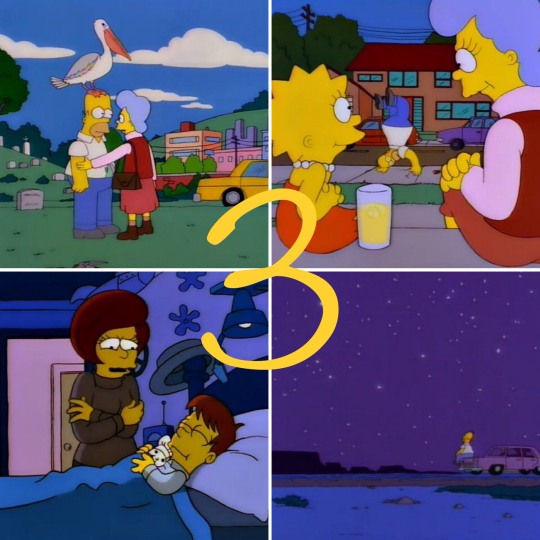
Mother Simpson
Defining Quote Homer: I thought I dreamed that kiss.
Some questions aren’t worth pursuing. We didn’t need to know the origin of the Xenomorphs from Alien, or the childhood of that Darth Vader guy. On the other side of that argument, we have this. Who was Homer’s mother, and why isn’t she there? She has always been a conspicuous absence, portrayed only once in flashback from the waist down and almost never mentioned ever. Here, we get some welcome answers. Homer fakes his own death to get out of a working Saturday, and when his “demise” is reported in the paper, his mother comes looking for his grave. They meet and reunite in the cemetery after twenty-seven years, and the Simpson family gains a welcome new member. Homer is overjoyed to have his mother back, and Lisa finds an instant kindred spirit in her grandma. However, the secret of her disappearance is soon revealed. Mona Simpson was forced to go into hiding after she took part in the destruction of Mr Burns’ germ warfare lab in the 60s and is still technically a wanted criminal. By the end of the story, she has no choice but to return to the underground and leave Homer behind. Many point to ‘Lisa’s Substitute’ as the show’s emotional apex, but not only is ‘Mother Simpson’ just as bittersweet, resonant and sad, it’s also funny as hell. Among the many many highlights, we have a young Chief Wiggum curing his asthma, Homer tragically ruining a perfect meeting, Grampa claiming to be the Lindbergh baby to stall the police and Smithers taping over Burns’ Wagner collection. If anything, the jokes provide a contrast that makes the inevitable separation even more poignant. Plus, Mona is an thoroughly loveable and memorable character. Played by the warm voice of Glenn Close, she’s affectionate, maternal, but fiercely self-reliant and intelligent. That being said, Dan Castellaneta as Homer might just take home the gold here.
Homer: She had a very good reason [to leave]. Marge: Which was? Homer: ...I dunno... I guess I was just a horrible son and no mother would want me. Marge: Oh Homie come on! You’re a sweet, kind loving man. I’m sure you were a wonderful son! Homer: Then why did she leave me?
In Homer’s voice, that last line is soul-shattering. To see him bask in so much overdue love from a missing parent, only to have it snatched away, is a real cruelty. But as he says to her on their parting “At least this time I’m awake for your goodbye”. All that’s left as she drives away is silence, with Homer sitting on his car, entirely still and watching the stars. Don’t watch this alone - you’ll need a hug afterwards.
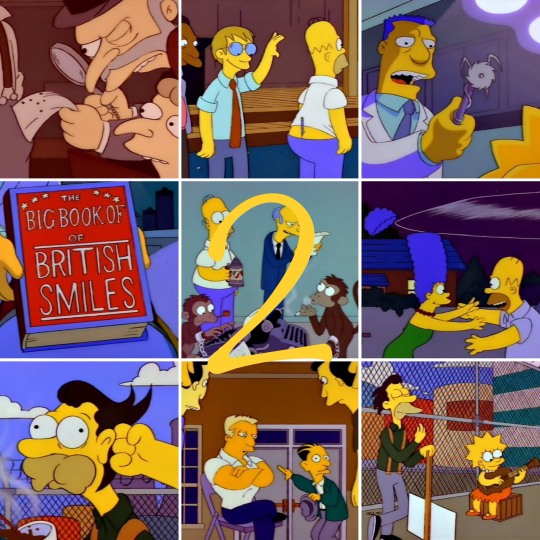
Last Exit To Springfield
Defining Quote Lenny Leonard: ...Dental plan!
It’s very clever. Almost too clever. Almost. Instead, it’s probably the funniest thing that’s ever been on television.
Quick Fun Fact Roundup
- The voice of Sideshow Mel is Dan Castellanetta doing an impression of Kelsey Grammar, the voice of Sideshow Bob.
- The Blue-Haired Lawyer is based on Roy Cohn, the chief counsel of Sen. Joseph McCarthy’s witch-hunts.
- There were plans for Hank Scorpio to be the lead antagonist for The Simpsons Movie, but these were scrapped in favour of the very unmemorable Russ Cargill.
- Homer’s voice actor Dan Castellanetta also plays the Robot Devil in Futurama, and the mentally unstable ice cream man in Hey Arnold!
- Marge’s voice actor Julie Kavner had it written into her contract that she would never have to promote The Simpsons on video. She is a sitcom veteran and won an Emmy in 1978. Her distinctive voice is due to a “bump” on her vocal chords.
- Moe The Bartender was modelled after the comedian Rich Hall.
- Nancy Cartwright, the voice of Bart Simpson, played the cartoon shoe who was murdered by Judge Doom in ‘Who Framed Roger Rabbit’.
- The catchphrase “Eat my shorts” was improvised by Cartwright at a table-read. It came from a joke-chant started by her school marching band.
- Cartwright is a member of the Church of Scientology. Cultwatch, a charity dedicated to providing advice and support for those whose friends and relatives had been indoctrinated into cults, was sued out of existence by Scientology. After this occurrence, Nancy Cartwright provided the voice of the switchboard, effectively turning the helpline into another outlet for the church.
- While almost all other cast members play multiple parts, Yeardley Smith plays Lisa and no one else. She did, however, provide the voice for Lisa Bella in ‘The Last Tapdance In Springfield’ and Lisa Jr from ‘Missionary: Impossible’.
- Hank Azaria, who voices multiple characters including Chief Wiggum and Moe, has a semi-regular role as David the Scientist in America’s “other” most-popular-sitcom ‘Friends’.
- Azaria based his performance of Wiggum on Edward G Robinson, and Frank Grimes on William H Macy.
- Dr Julius Hibbert has two long-lost brothers. One is revealed to be Bleeding Gums Murphy, the other works at the Shelbyville Orphanage and is still trying to find his sibling. Hibbert was originally intended to be a woman named Julia.
- The oldest regular cast member is Harry Shearer, voice of Principal Skinner, Ned Flanders, Mr Burns and a host of others. He is one of a very small handful of people to have seen the infamous “buried” film ‘The Day The Clown Cried’. This film was made by comedian Jerry Lewis and is a comedy about a clown who entertains children at a Nazi concentration camp. Incidentally, Hank Azaria based his performance of Professor Frink on Jerry Lewis.
- Harry Shearer is a friend and colleague of Christopher Guest and co-starred in his films This Is Spinal Tap and A Mighty Wind. In both of them, he plays the electric bass and double bass respectively. He and his wife own a record label called Courgette Records. His Spinal Tap bandmates guest-starred on ‘The Otto Show’.
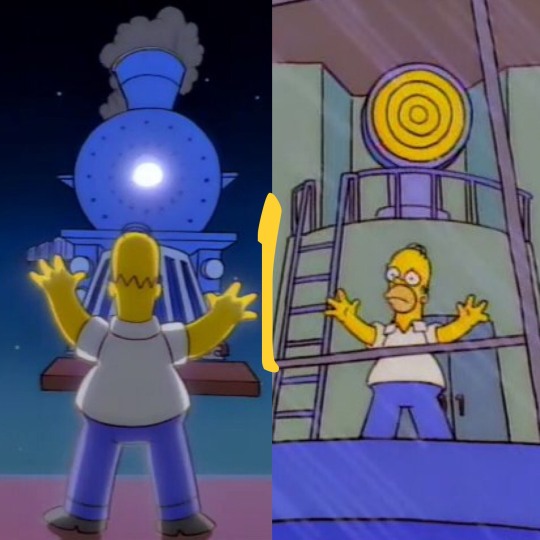
El Viaje Misterioso de Nuestro Jomer (The Mysterious Voyage of Homer)
Defining Quote Homer: “Just gimme some inner-peace or I’ll mop the floor with ya!”
There’s a spark of loneliness in all of us. It lives in single people; it lives in those with partners; it lives in the members of every tight-knit community, church, kibbutz, farm or sex-cult. It waits for that moment when you feel the interstellar coldness of the universe blow a breeze down your neck, and all your certainties are swallowed by doubt. Reality can be thrown off-balance by a significant life change, or by an ordinary working day - or, it seems, when you swallow a dozen Guatemalan insanity peppers. The Mysterious Voyage of Homer is The Simpsons’ greatest artistic achievement. It takes an intangible subject and makes it fun, beautiful and exploratory. Homer promises Marge that he won’t get drunk at the annual Chili Cook-off, and though he keeps that promise, he experiences a powerful hallucination brought on by Chief Wiggum’s extra-strong recipe. The trip sequence is brain-bending, from the liquid-skin movements to the Marge-mirage to the otherworldly sky textures. It’s the most visually spectacular the show ever got. It was also entirely animated by one person - director David Silverman who insisted on handling the project personally to ensure it was exactly what he wanted. And let’s not forget the space coyote, Homer’s spirit-guide played by (no joke) Johnny Cash. The show-runners originally asked Bob Dylan and thank goodness he turned it down, because Cash knocks it out of the park. (And seriously, can you imagine taking spiritual advice from Bob Dylan’s weedy shipwreck of a voice? Ugh.) For many (myself included), this sequence was their first crash-course in surrealism. There’s still nothing like it. Nonetheless, the episode’s emotional weight reveals itself when the trip ends, and an argument with Marge causes him to spiral down into an existential plughole. Homer’s desperate irrationale culminates in him smashing the bulb in a lighthouse (a less imaginative writer might have thrown in a straight-up suicide attempt). It’s only when Marge arrives to talk him back down to earth that he regains his perspective and love of life. For the record, this wouldn’t be at the top of the list if it wasn’t also hilarious. You’ve got Homer with his fabled chili-spoon, the extra-slow desert tortoise, Marge’s brief smoking habit, and - even though they’re pushed into the background - nearly every line from Bart and Lisa is a low-key classic. Comedy is seen as something of a “low” art form. If you’ve watched enough of The Simpsons at its best, you know that’s bullshit. Life is so often miserable. What makes it worthwhile is joy. This might come from the profound and mystical understandings we develop with others, or the unexpected sight of hundreds of pairs of hotpants falling into the ocean. Aye, the hotpants indeed. Silliness is art and seriousness is art - ‘The Mysterious Voyage of Homer’ is about as complete as art gets.
1 note
·
View note
Text
The Best Simpsons Episodes (With Showing My Work)
In one episode of the Simpsons, Homer and Lisa have a fight, and Lisa disappears, and Marge askes Homer where she went, and Homer responds that she better be out making him a great big chocolate apology cake. I don’t even remember what episode that’s from. It’s just a line that sticks out in my head about once a week. The point is, the Simpsons is the funniest show anybody has ever made. It’s probably responsible for 75% of my sense of humor. Probably every male between the ages of 25 and 35 can say the same thing.
But what episode is the best? Here is my top ten. And I’m not here to say this is the definitive top ten, or that you’re stupid if you don’t agree. The Simpsons is like music, it’s just here to enrich your life. You probably have your own top ten, but this is mine:
Season 2:
Lisa’s Substitute
Season 3:
When Flanders Failed
Season 4:
Homer the Heretic
Mr. Plow
Lisa’s First Word
I Love Lisa
Whacking Day
Season 5:
Homer’s Barbershop Quartet
Rosebud
Homer the Vigilante
Homer and Apu
Homer Loves Flanders
Bart Gets an Elephant
Sweet Seymour Skinner’s Baaadaaasssss Song
The Boy Who Knew Too Much
Season 6:
Lisa’s Rival
Homer Badman
Grampa vs. Sexual Inadequacy
Bart’s Comet
A Star is Burns
The Springfield Connection
Lemon of Troy
Who Shot Mr. Burns Pt 1
Treehouse of Horror V (The Shinning, Time and Punishment, Nightmare Cafeteria)
Season 7:
Home Sweet Homediddly-Dum-Doodily
Lisa the Vegetarian
King-Size Homer
Mother Simpson
Team Homer
Two Bad Neighbors
Raging Abe Simpson and His Grumbling Grandson in The Curse of the Flying Hellfish
Summer of 4 Ft. 2
Season 8:
Bart After Dark
Lisa’s Date with Density
Hurricane Neddy
Brother From Another Series
Homer vs. the Eighteenth Amendment
Grade School Confidential
Burns Baby, Burns
Season 9:
Lisa’s Sax
The Cartridge Family
The Two Mrs. Nahasapeemapetilons
Lisa the Skeptic
The Joy of Sect
Lisa the Simpson
Simpson Tide
Criteria:
Every episode will be judged on the following criteria:
Does it have a jaw-dropping hilarious joke?
How many good jokes does it have?
Does it have something that stands out to me instantly? Like for example great big chocolate apology cake?
Is it good, in addition to being funny? The Flying Hellfish Episode is hilarious and also a really cool episode of tv
Is it sweet or sincere? Lisa’s Substitute isn’t that funny, but it’s really sweet and has a great message
Other
Lisa’s Substitute:
Jaw-dropping hilarious joke: none I can think of
Lots of good jokes: I actually can’t think of a single great joke from this episode. Something abo Bart running for office and everyone being too cool to actually vote for him, maybe
Something that stands out instantly: Yes, the ending, which isn’t funny at all, it’s totally serious, but it chokes me up
Is it good: Absolutely. One of the sweetest episodes of all time. Lisa’s substitute tells her incredible things about life and her future, and then Homer has a moment of great parenting and is smart enough to appreciate it.
Is it sweet: Yes. Maybe the sweetest and most sincere episode of the series.
This is a great episode but not quite funny enough to make the cut.
When Flander’s Failed:
Jaw-dropping hilarious joke: No
Lots of good jokes: Yes. Barney becomes a sex symbol as soon as he puts on a “Kiss Me I’m Lefthanded” shirt
Something that stands out instantly: Yes, the ending, which is actually really sweet and sincere, but also kinda funny
Is it good: It’s great. Homer has an arc where he goes from being a jealous neighbor to being a total dickhead and then to redeeming himself with a great moment of decency. He also requires four beers to do it. It’s also just a good story.
Is it sweet: Yes. I’m a sucker for the sweet episodes. I love the ending to this one, where Homer wrangles the whole town to help Ned, and the whole town is willing because of Ned’s decency. I love good guy Homer.
This isn’t as moving as Lisa’s Substitute, but it’s funnier. But I can still find a better sweet/funny episode. This one doesn’t quite make the cut.
Homer the Heretic:
Jaw-dropping hilarious joke: Almost. The sequence of Homer skipping church and having the greatest morning ever, complete with wrapping a waffle around a stick of butter, and enjoying a football game that replaces a news talk show on TV for no reason, is a masterpiece.
Lots of good jokes: This episode stands out for having one of the best sequences of the series, but it slows down a little in the second half. It picks up at the end though when Homer fantasizes Ned’s house burning down while he relaxes in the hammock.
Something that stands out: Yes, the skipping church sequence.
Is it good: It’s funny and clever but doesn’t have its own story arc that is particularly strong on its own.
Is it sweet: Not particularly. Ned does a good thing for Homer, and I suppose if you think faith is a good thing you’ll enjoy the ending.
A great one, maybe not quite funny enough to make the cut.
I Love Lisa:
Jaw-dropping hilarious joke: Not quite.
Lots of good jokes: Oh god yes. It says “choo” on it and there’s a picture of a train! Homer using Ralph to do yardwork. Chief Wiggum shooting a nut and then threatening the rest of the nuts. “Everyone knows I’m the best actor in this ridiculous school!” “I am not a butt.” Bart as John Wilkes Booth. The George Washington play inspiring the bullies to go learn more about American history. The soundtrack, which bookends the episode with “Monster Mash.” This is when the Simpsons hits its 3 hilarious jokes per minute stride.
Something that Stands Out: For some reason “I choo-choo-choose you has always stuck out in my head. And as a fan of the season of fall I’m also a fan of the fall episodes. When I was a kid fall was an actual season.
Is it good: Yes. It’s not amazing, but any show that makes its own President’s Day episode gets some points from me.
Is it sweet: Kinda. The ending is a good resolution. If Homer is the primary joke maker of the show and Bart is the little asshole who’s too charismatic to hate, then Lisa is the heart, and secretly the best character.
This one didn’t make my first cut because I assumed my affection for it was nostalgia, but it definitely makes the list.
Bart Gets an Elephant:
Jaw-dropping hilarious joke: Ehhhh maybe not, but it has about three that are damn close.
Lots of good jokes: A guy who works in a peanut shop giving an extended monologue about how he was right to initiate a training for how to deal with a rampaging elephant even though everyone laughed at him, but then getting trampled anyway because he took too long to deliver the monologue is the highlight of this one, but there are dozens of others.
Something that Stands out: Not particularly, other than that when I think about this episode I think about just how many highlights it has. Barney Gumble is trapped inside an oil pit for some reason. As soon as he is rescued he lights up a cigarette and the tar on his body causes him to catch fire. He doesn’t even smoke!
Is it good: Yes. I love most Bart episodes, especially the ones that show that deep down Bart is just a sweet kid who’s weird enough to fall in love with a pet elephant.
Is it sweet: Not really. Maybe a little.
This will probably make the cut.
Lisa’s Rival:
Jaw-dropping hilarious joke: Sugar.
Lots of good jokes. Yep. Bart gets Milhouse on the FBI’s Most Wanted List, then tips off the FBI as to his location.
Something that Stands Out: I don’t know why, but I’ve always loved that during the saxophone competition between Lisa and her rival, all the other kids are dancing. To me that’s why the Simpsons isn’t just hysterical, it’s also good and decent in a way that none of its descendants ever really were. There’s something so wholesome about all these kids just appreciating good saxophone music.
Is it good: Yes. It’s great. Lisa learns a lesson and makes a friend.
Is it sweet: Yes. Most Lisa episodes usually are.
I love this episode. It is near and dear to my heart, and not even for the jokes as much as for the story.
Grampa Vs. Sexual Inadequacy:
Jaw-dropping hilarious joke: Yes. They didn’t start chasing us until you turned on that chase music.
Lots of good jokes: Yes. Dozens. Mostly in the middle, when Homer and Abe go into business together.
Something that stands out: Chase music.
Is it good: It’s great. One of my favorite serious moments at the end where Homer and Abe come to terms with the fact that they’re both screw ups.
Is it sweet: Yeah.
Is the middle section of this episode strong enough to carry a slightly less memorable beginning, and a weaker side-story? Possibly.
A Star is Burns:
Jaw-dropping hilarious joke: McBain 4, Let’s Get Silly.
Lots of good jokes: Upon further inspection, these are loafers isn’t even the funniest part of this episode, which ends with George C. Scott winning an Oscar for stealing Hans Moleman’s idea for a movie. Yes.
Something that Stands Out: I always thought Man Gets Hit By Football looked like a pretty damn good movie.
Is it good: Yes. I actually love that they did a crossover episode with the Critic, even though Matt Groening apparently hated it.
Is it sweet: Not particularly.
This episode has so many highlights that it has to at least be in consideration.
Lemon of Troy:
Jaw-dropping hilarious joke: I don’t think so.
Lots of good jokes: Yes, this episode in fact ups the ante on jokes per second. The fake wig that makes Bart look like the Beatles. The Homer doppleganger who bites into a lemon and pretends not to hate it.
Something that stands out: Not that I can think of.
Is it good: Yes, as a story this is one of my favorite episodes ever. I don’t know why. Maybe it just reminds me of being a kid.
Is it sweet: Not particularly.
I love this episode so much, there’s no way it doesn’t make the top ten.
Treehouse of Horror V:
Jaw-dropping hilarious joke: I’ve always loved Homer turning the car around twice to lock the house doors.
Lots of good jokes: This is the best Treehouse of Horror episode so it automatically warrants consideration. Anyway, yes, there are lots of good jokes. Nightmare Cafeteria is slightly weaker than the other two for comedy, but it’s the scariest of the three.
Something that stands out: It always bugged me that Homer turned down a rich and fancy life with no sisters-in-law because he couldn’t stick around for another 10 seconds to see that it rained donuts.
Is it good: I’m starting to wonder if maybe the Treehouse of Horror where Willie haunts the kids’ dreams isn’t better than this one. But no, don’t overthink this. These are three perfect mini-stories.
Is it sweet: Um, Willie keeps trying to save the day?
I don’t think this will make the cut but it is glorious.
Team Homer:
Jaw-dropping hilarious joke: I can quote the entire “that team sure did suck last night” sequence, up to the ensuing conversation Homer has with his children.
Lots of good jokes: Oh god yes. Every damn minute of this masterpiece.
Something that stands out: I mean I’ve seen teams suck before, but they were the suckiest bunch of sucks that ever sucked.”
Is it good: Yes, mostly just for how funny it is.
Is it sweet: No.
This is when these episodes start to get so funny that trying to rank them is kind of impossible and not even really that satisfying. But this has always stood out in my mind and will make the top ten.
Raging Abe Simpson:
Jaw-dropping hilarious joke: not really
Lots of good jokes: Yes. It really isn’t fair that a pelican chooses to land on Abe’s head and drop a fish in his pants at the exact moment when Mr. Burns is questioning his dignity.
Something that stands out: Abe, unlike his son, was actually quite the badass when he was younger.
Is it good: Yes. If this episode cracks the top ten it will be on the strength of its plot, which is possibly my all time favorite Simpsons plot (btw, all-time favorite subplot in an otherwise lesser episode is a tie between Homer going into the grease business and Homer going into the sugar business, which now that I think about it is in Lisa’s Rival, which means that episode is definitely shooting into the top ten)
Is it sweet: Yeah, Bart spends time with his grandpa and realizes that he’s actually cool.
Summer of 4 Ft. 2:
Jaw-dropping hilarious joke: “Hey he looks just like you poindexter!” “What are you talking about you got the dud right here! Stand up for yourself poindexter.”
Lots of good jokes: Yes. This is one of those episodes where the main plot is a relatively straight story about Lisa, while the Homer subplot steals all the best moments. I bet if I dissected this further most of my favorite episodes would be like that. The Bart subplot is also hysterical. “They must have seen you.”
Something that stands out: The whole Mystery Date sequence should be played on a loop on a tv screen on my tombstone, just so my mourners can enjoy it for eternity.
Is it good: Yes, like almost all Lisa episodes.
Is it sweet: Yes, like almost all Lisa episodes.
Lisa’s Date with Density:
Jaw-dropping hilarious joke: Not quite, although I’ve always been a fan of “you kissed a girl, that is so gay!”
Lots of good jokes: Yep.
Something that stands out: Another one where you realize that Lisa Simpson really is an amazing person.
Is it good: Yes.
Is it sweet: Kind of.
I didn’t do this episode justice with that description, but it is one of my favorites.
Homer vs. the 18th Ammendment:
Jaw-dropping hilarious moment: I think there are about 7.
Lots of good jokes: Rex Banner is having a birthday party where his subordinate cops take him out for ice cream, but he can’t enjoy it because he can’t catch the beer baron. That’s about the 97th funniest part of this episode.
Something that stands up: This might be the funniest episode of the whole show. I don’t know what it’s competition would be.
Is it good: It’s amazing.
Is it sweet: Homer saves Wiggum’s job, maybe?
A top ten. Possibly number 2 of all time.
Burns Baby, Burns:
Jaw-dropping hilarious moment: Too Many Grandmas.
Lots of good jokes. Yes. I was kinda down on this one for some reason before I started but there’s no way it isn’t a top ten.
Something that stands out: Too Many Grandmas. There are just way too many grandmas.
Is it good: Oh god yes.
Is it sweet: In no way.
A masterpiece. Probably a top five.
The Two Mrs. Nahasapeemapetilons:
Jaw-dropping hilarious moment: Yes.
Lots of good jokes: Yes.
Something that stands out: Yes.
Is it good: Yes.
Is it sweet: Actually, yes.
My favorite episode. This one isn’t even that hard for me. It gets slightly less funny at the end, but that’s like saying sex with Kate Upton got a little bit difficult at that one point where you had to think about baseball to keep from cumming too early. This is the banging Kate Upton of Simpsons episodes.
The Joy of Sect:
Jaw-dropping hilarious moment: Actually, I don’t think so.
Lots of good jokes: Yes. Tons. Many of which are almost jaw-dropping.
Something that stands out: This is one of the weirder episodes, and one with one of the best plots.
Is it good: Yes. Amazing.
Is it sweet: maybe?
There’s no way this doesn’t make the list
10. I Love Lisa
9. Burns Baby, Burns
8. Bart Gets an Elephant
7. The Joy of Sect
6. Lisa’s Rival
5. Lisa’s Date with Density
4. Team Homer
3. Lemon of Troy
2. Homer vs. the 18th Amendment
1. The Two Mrs. Nahasapeemapetilons
0 notes